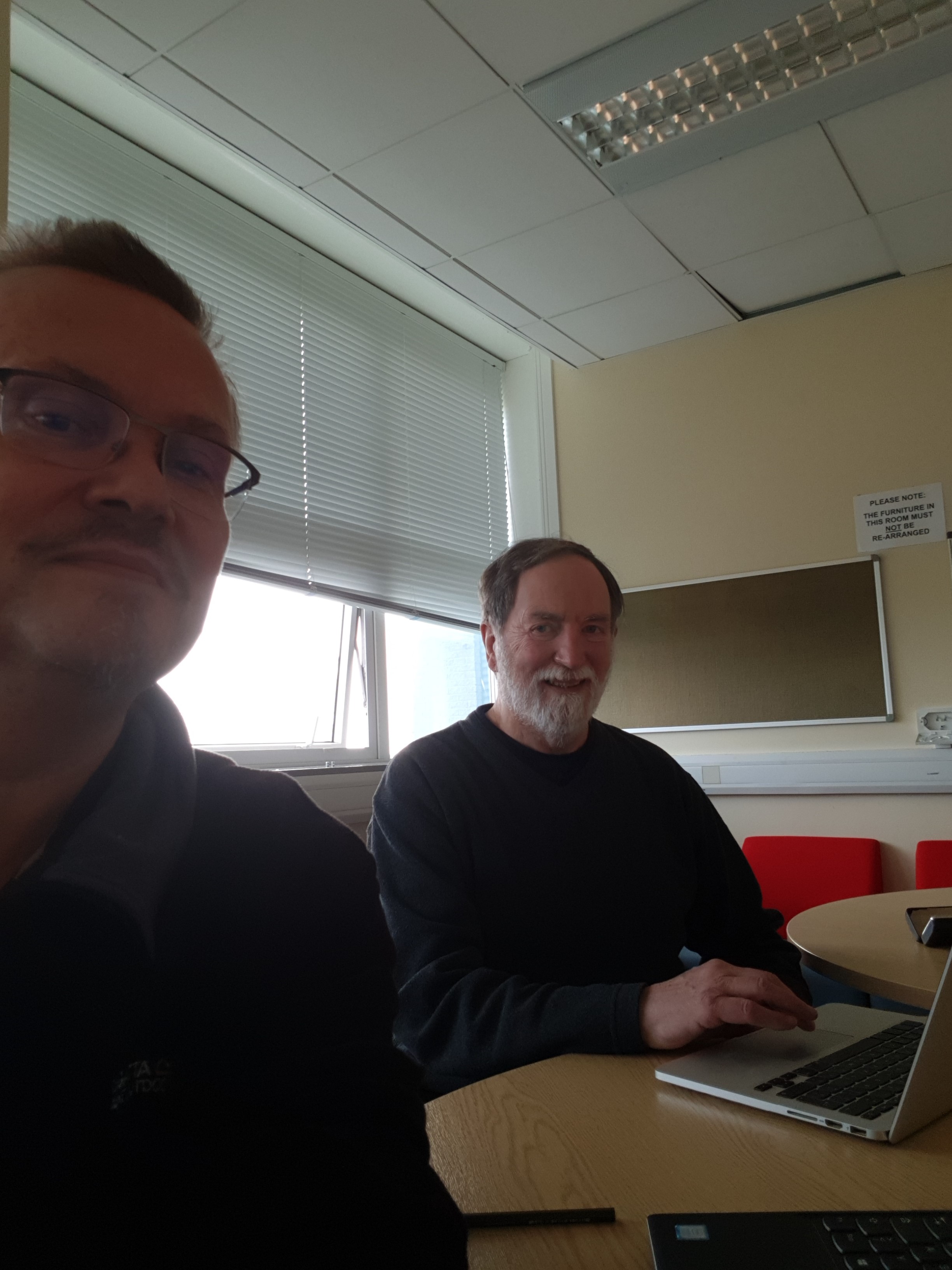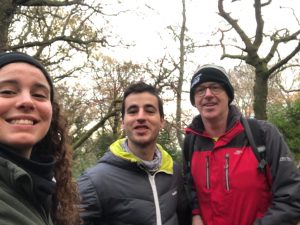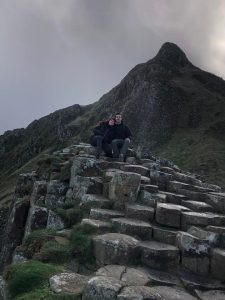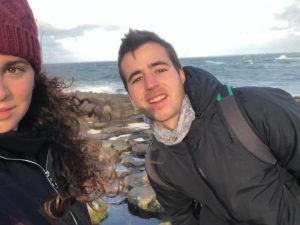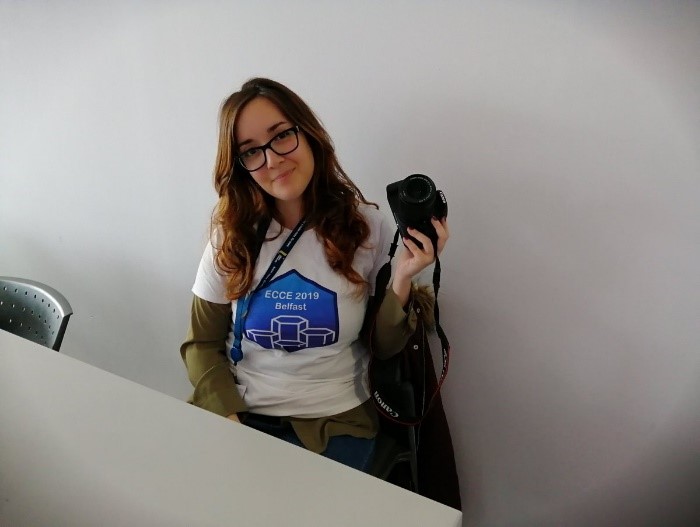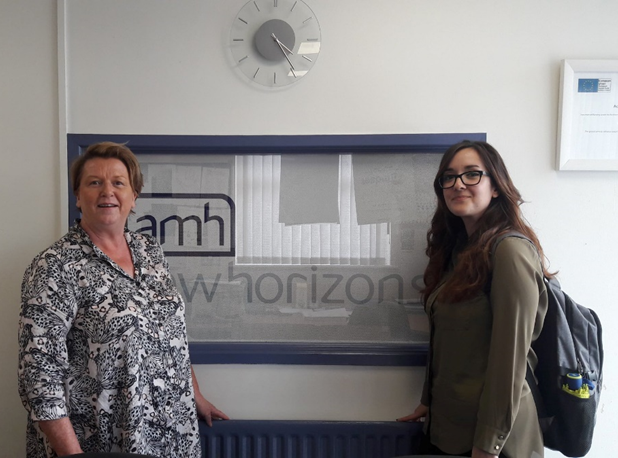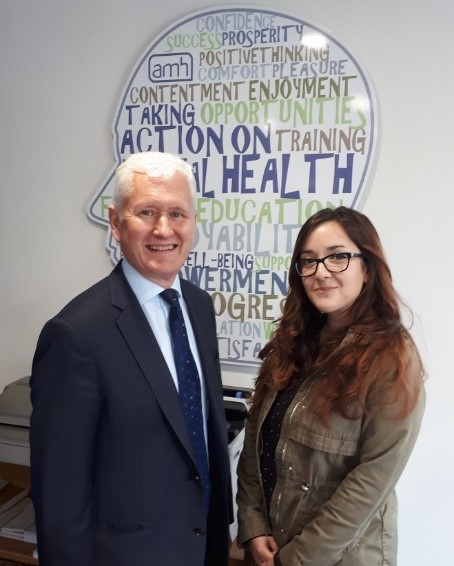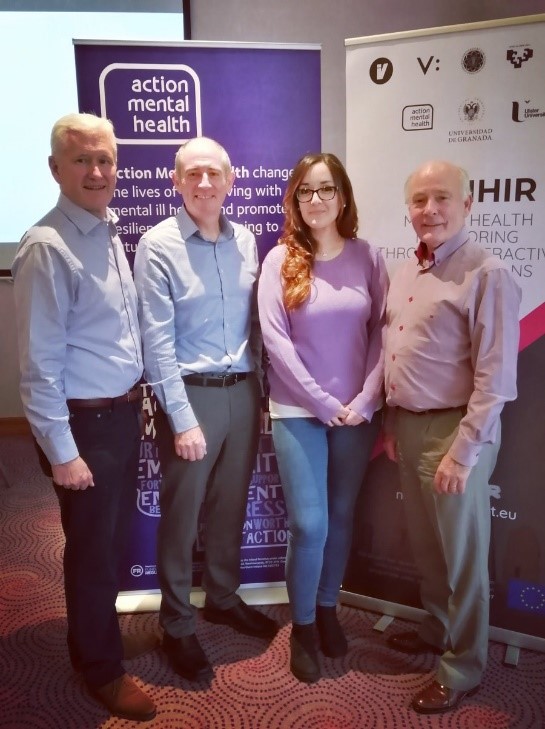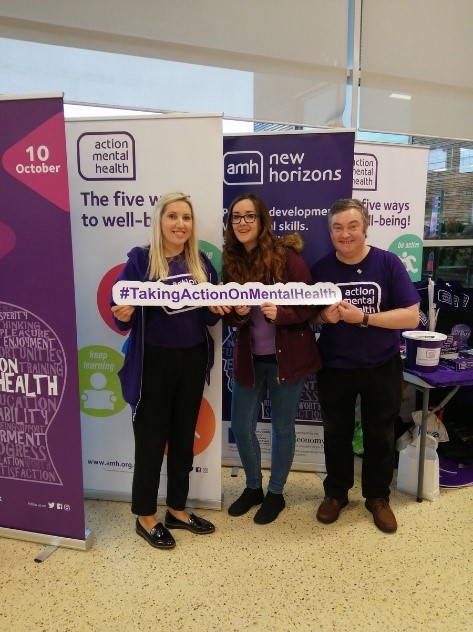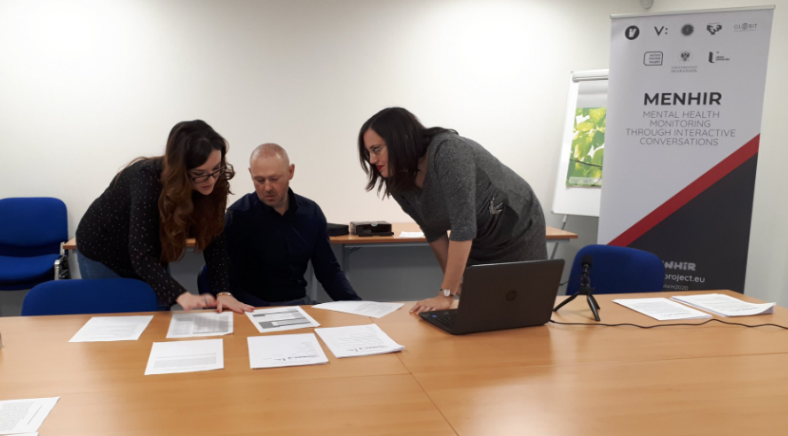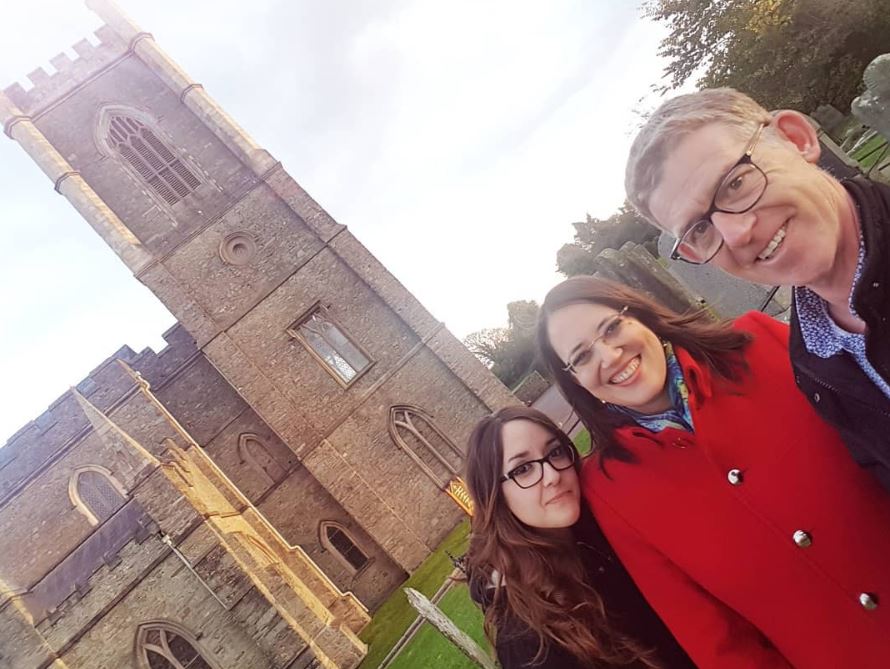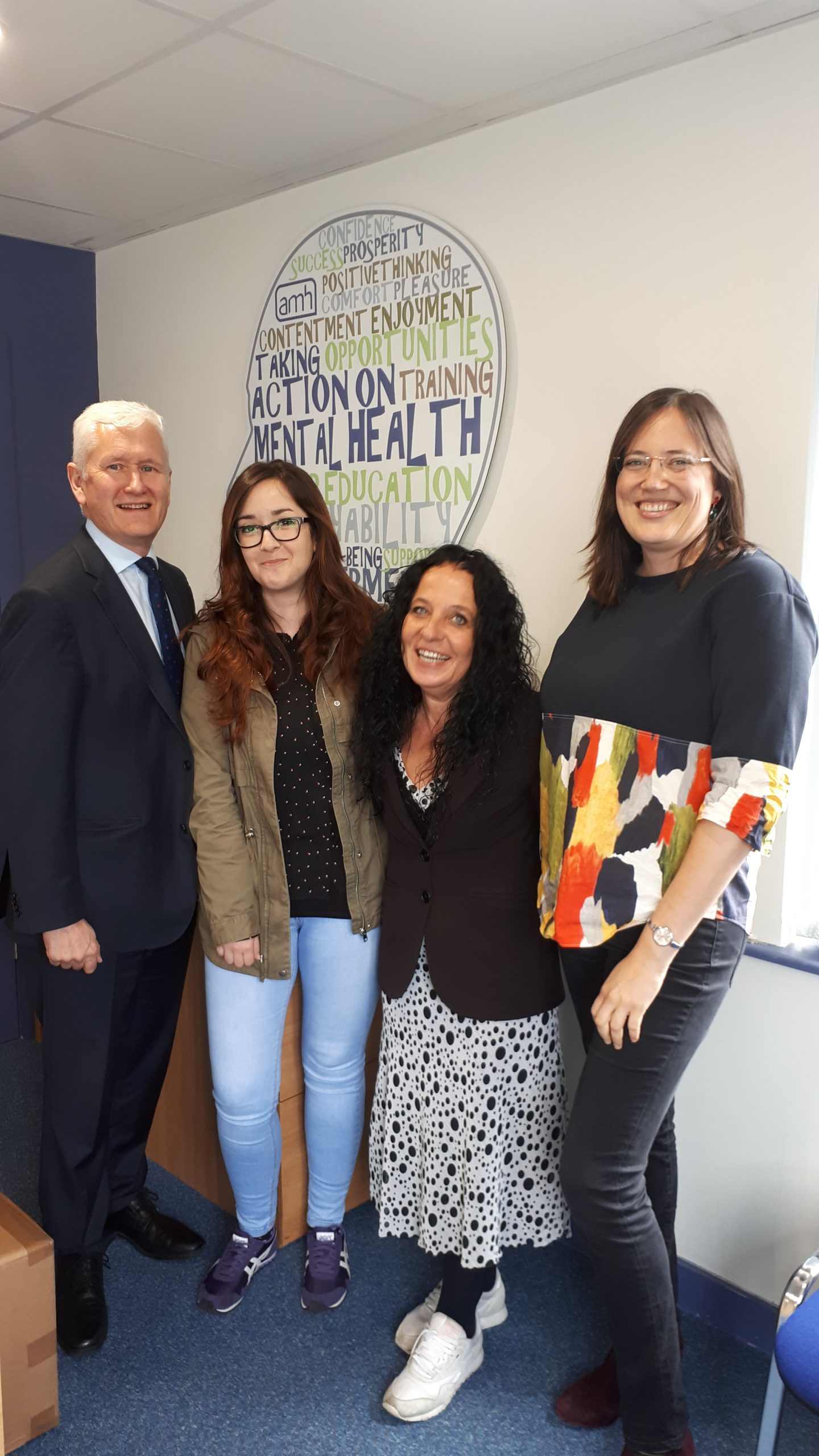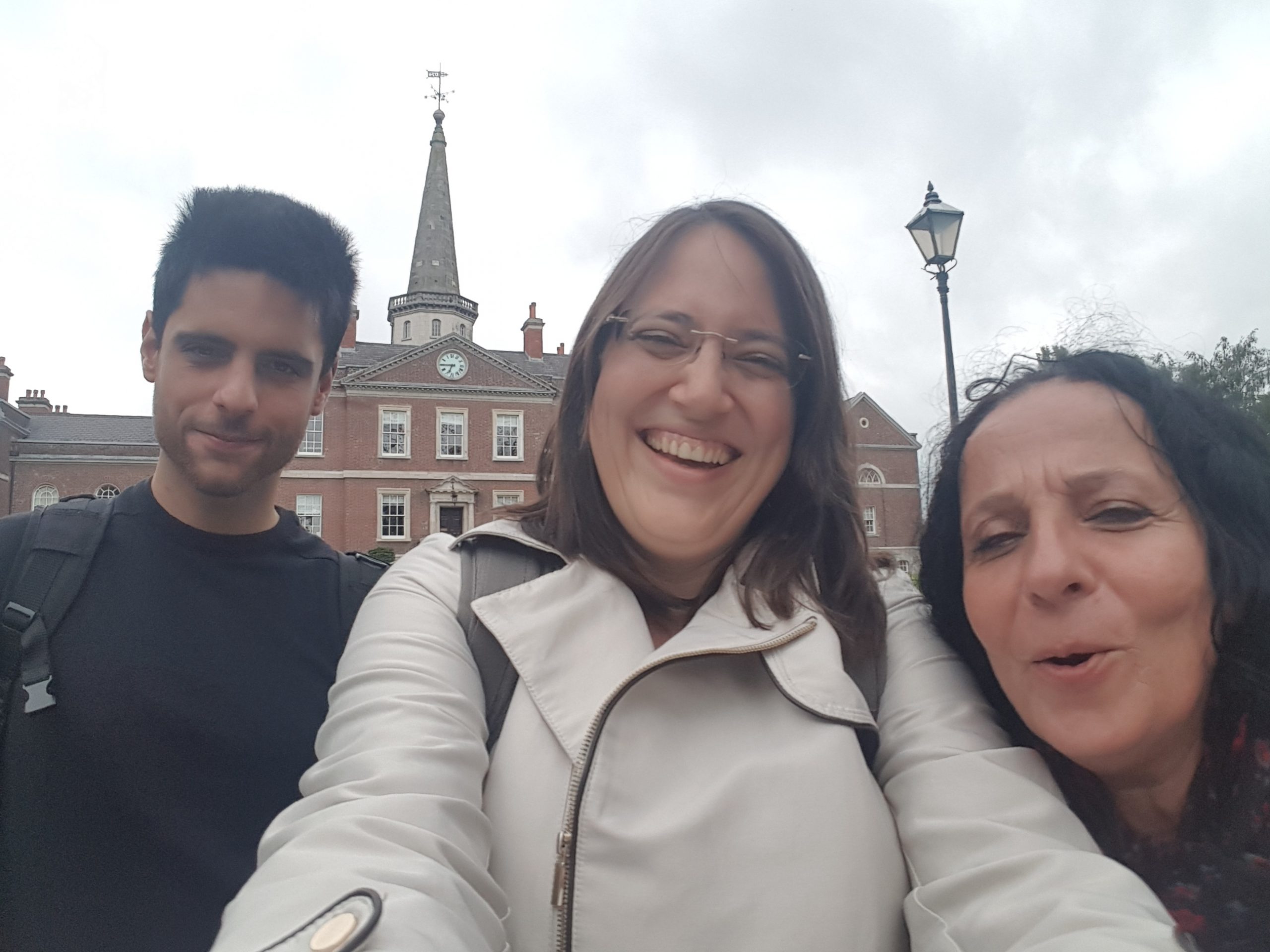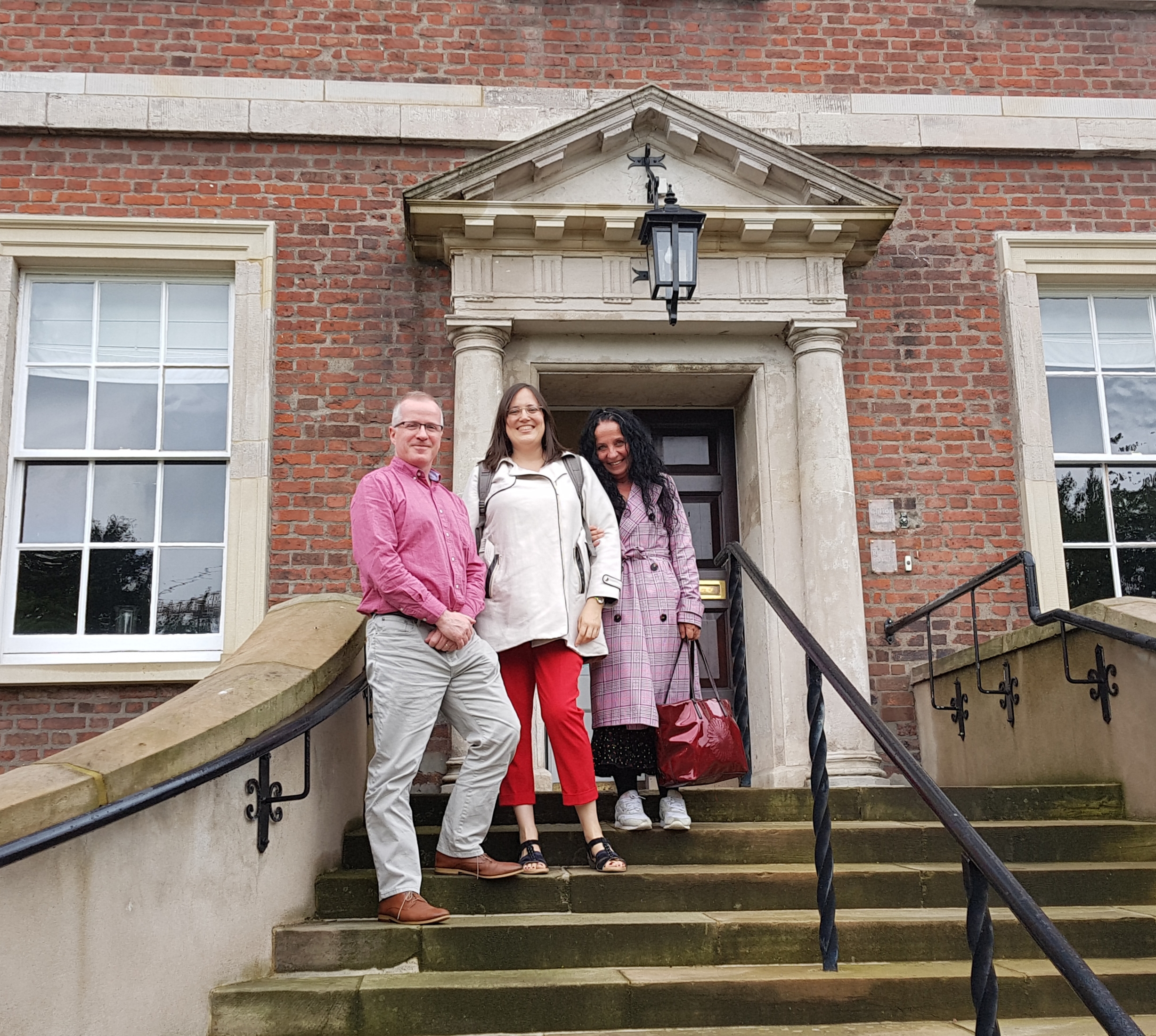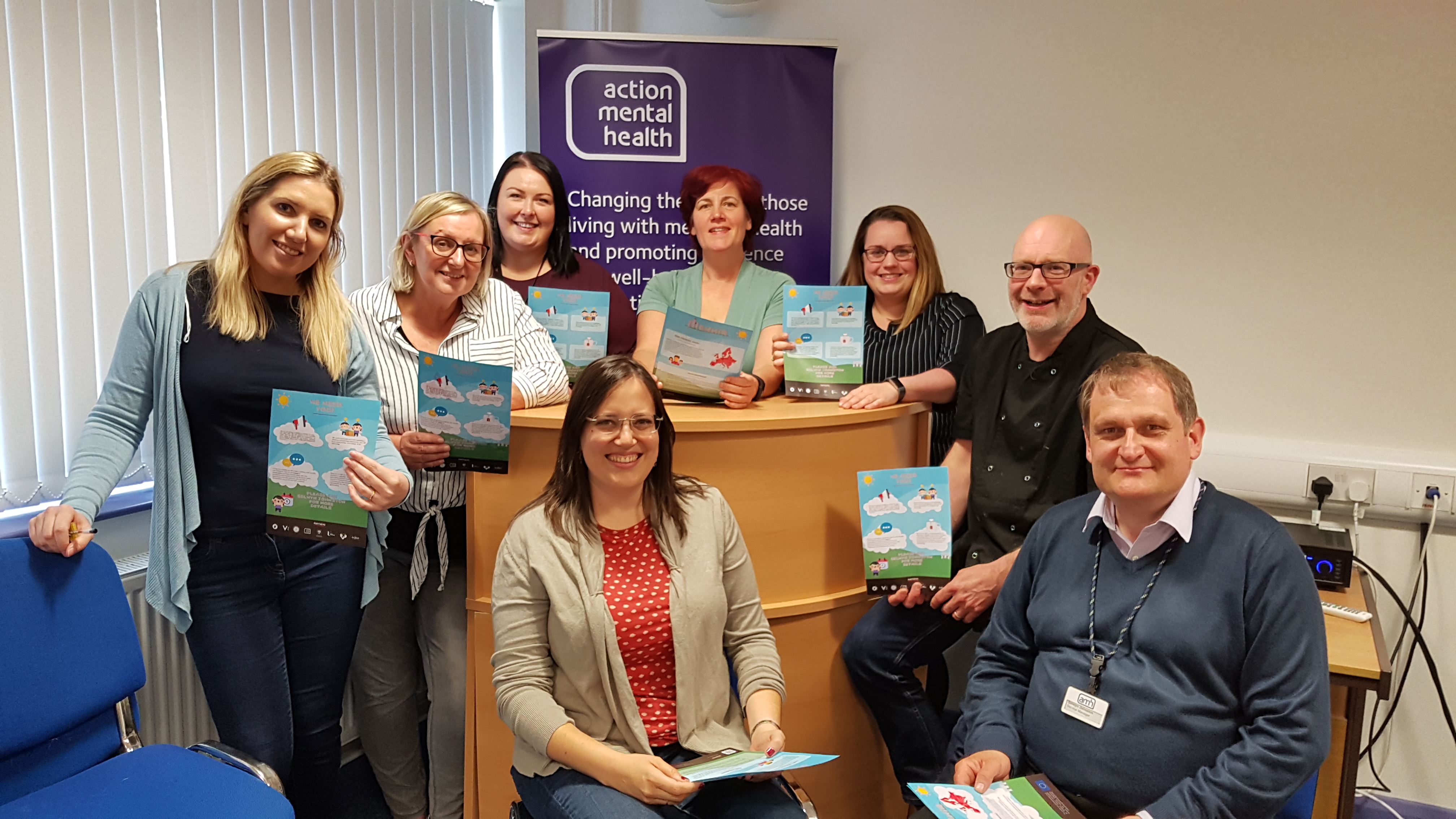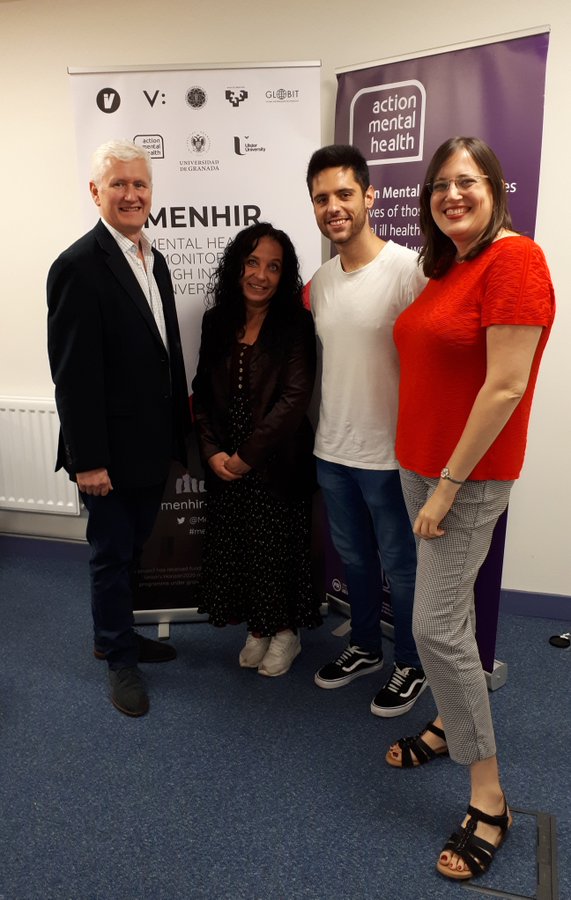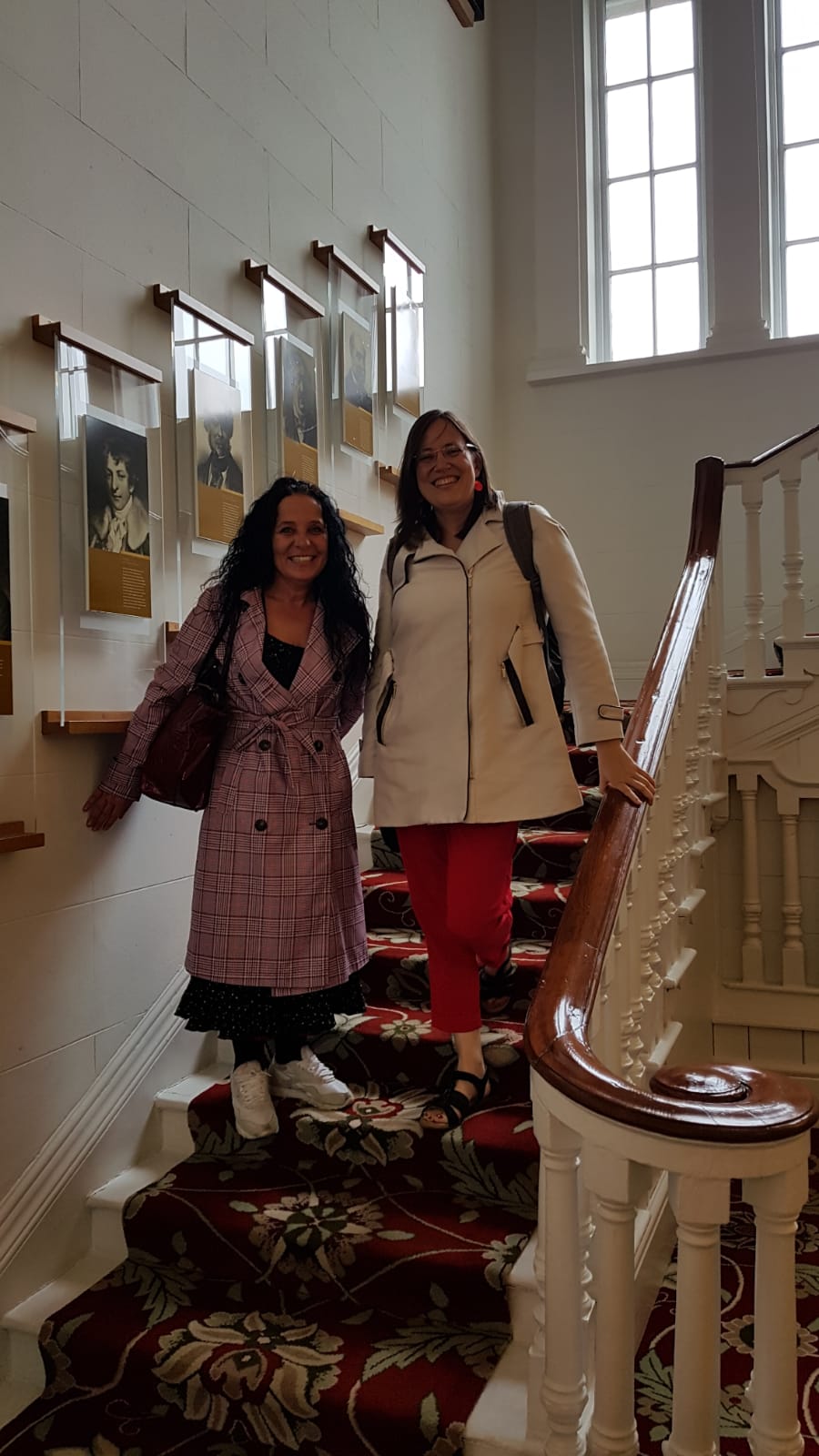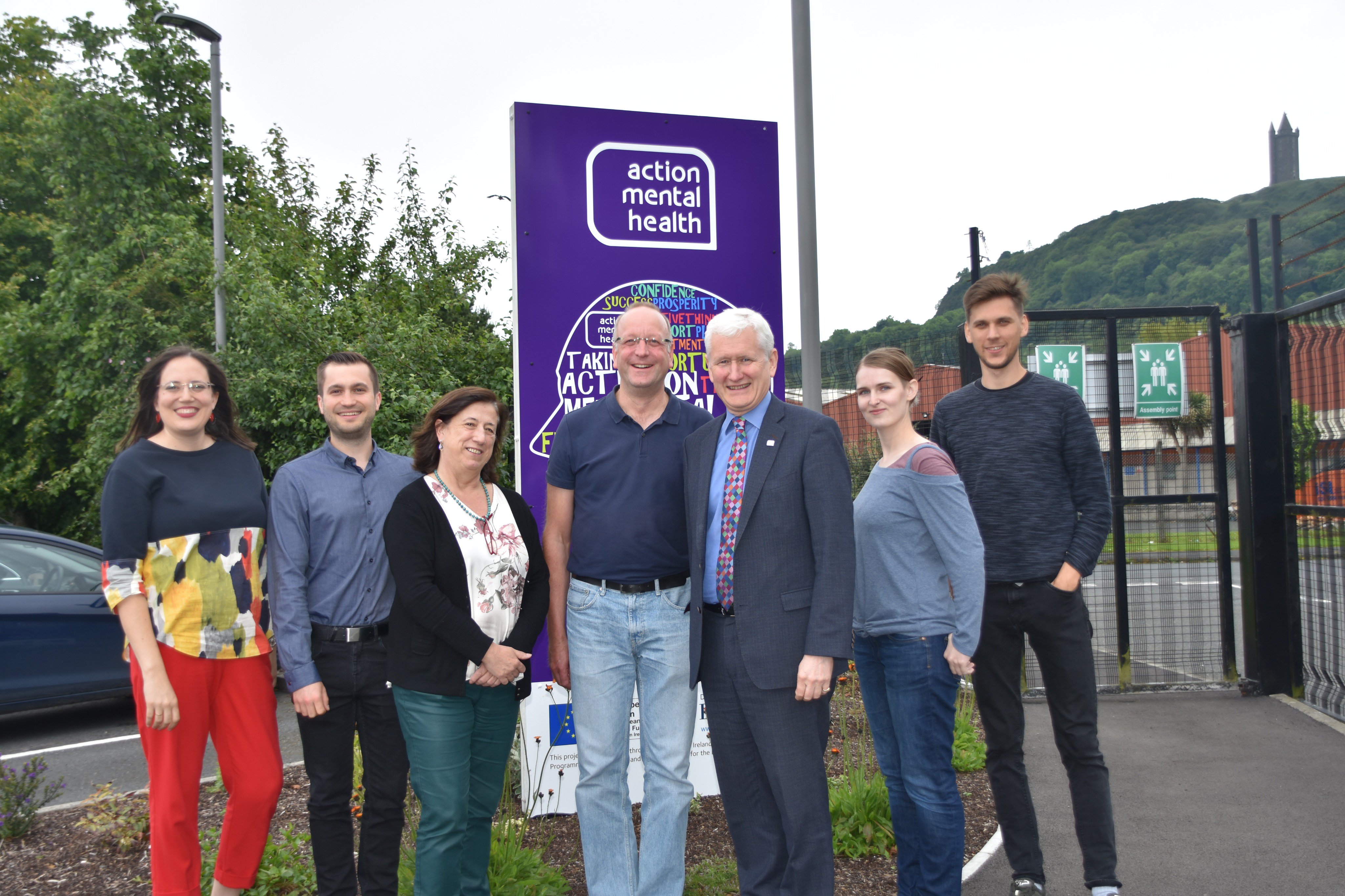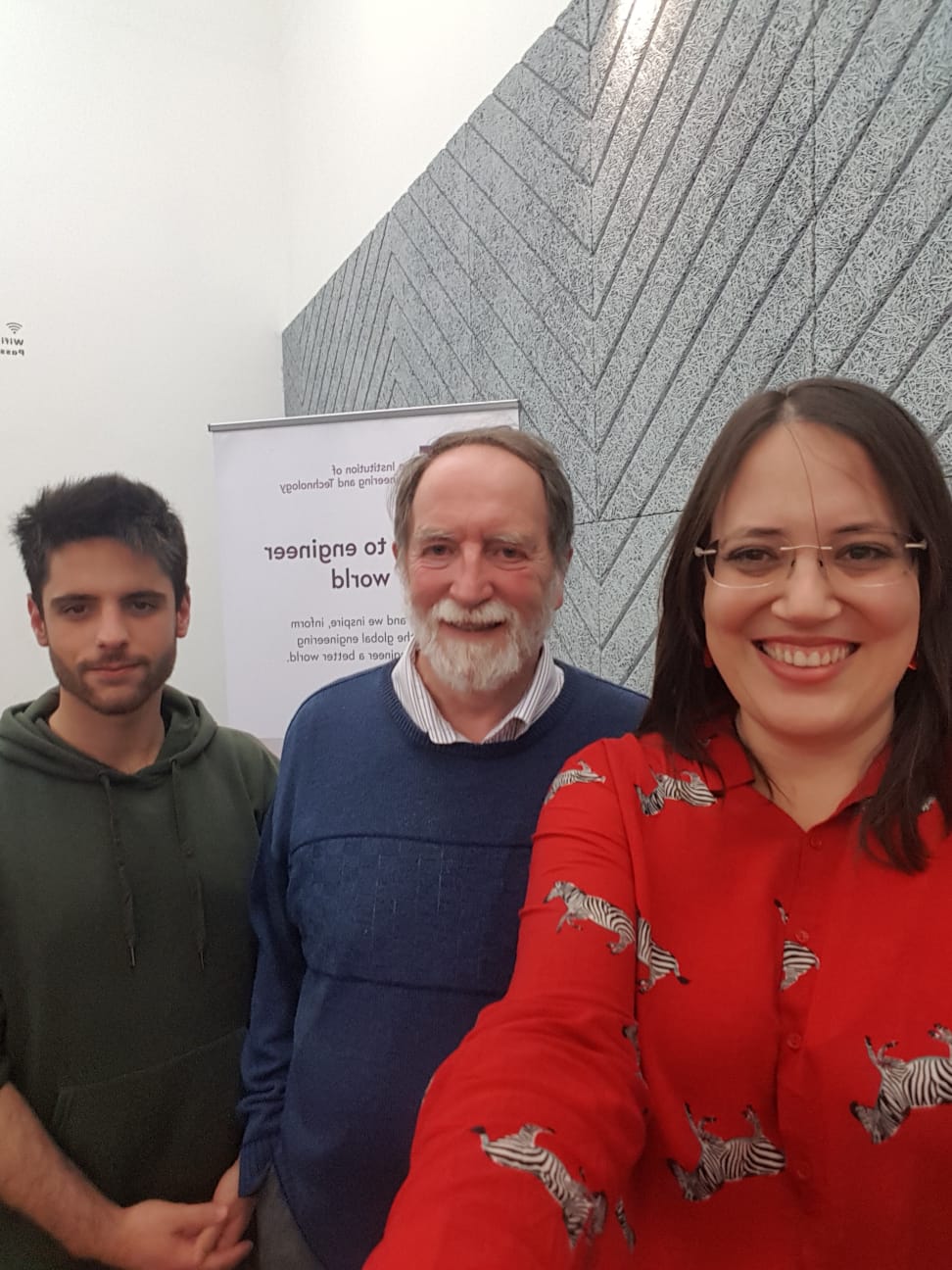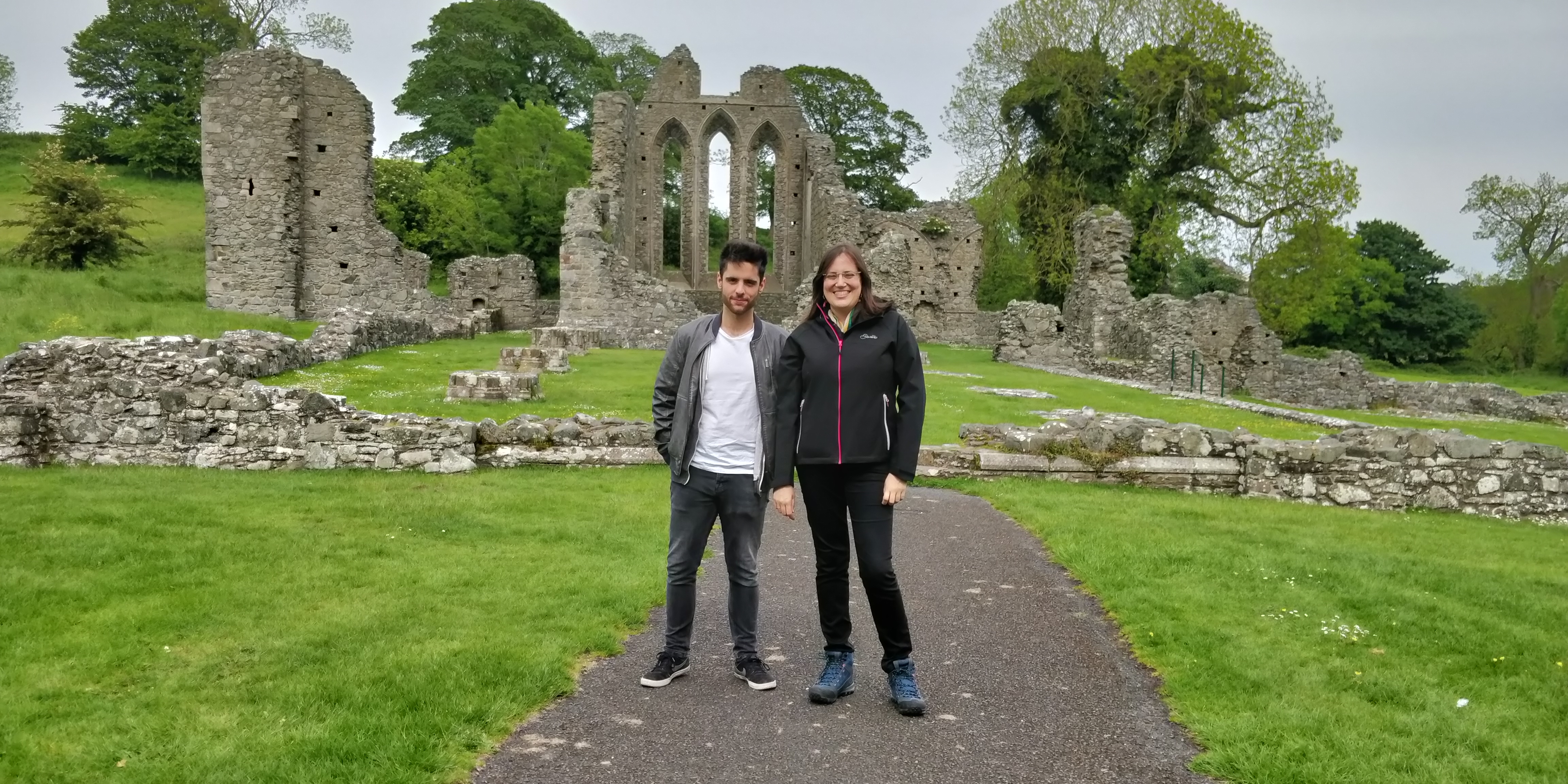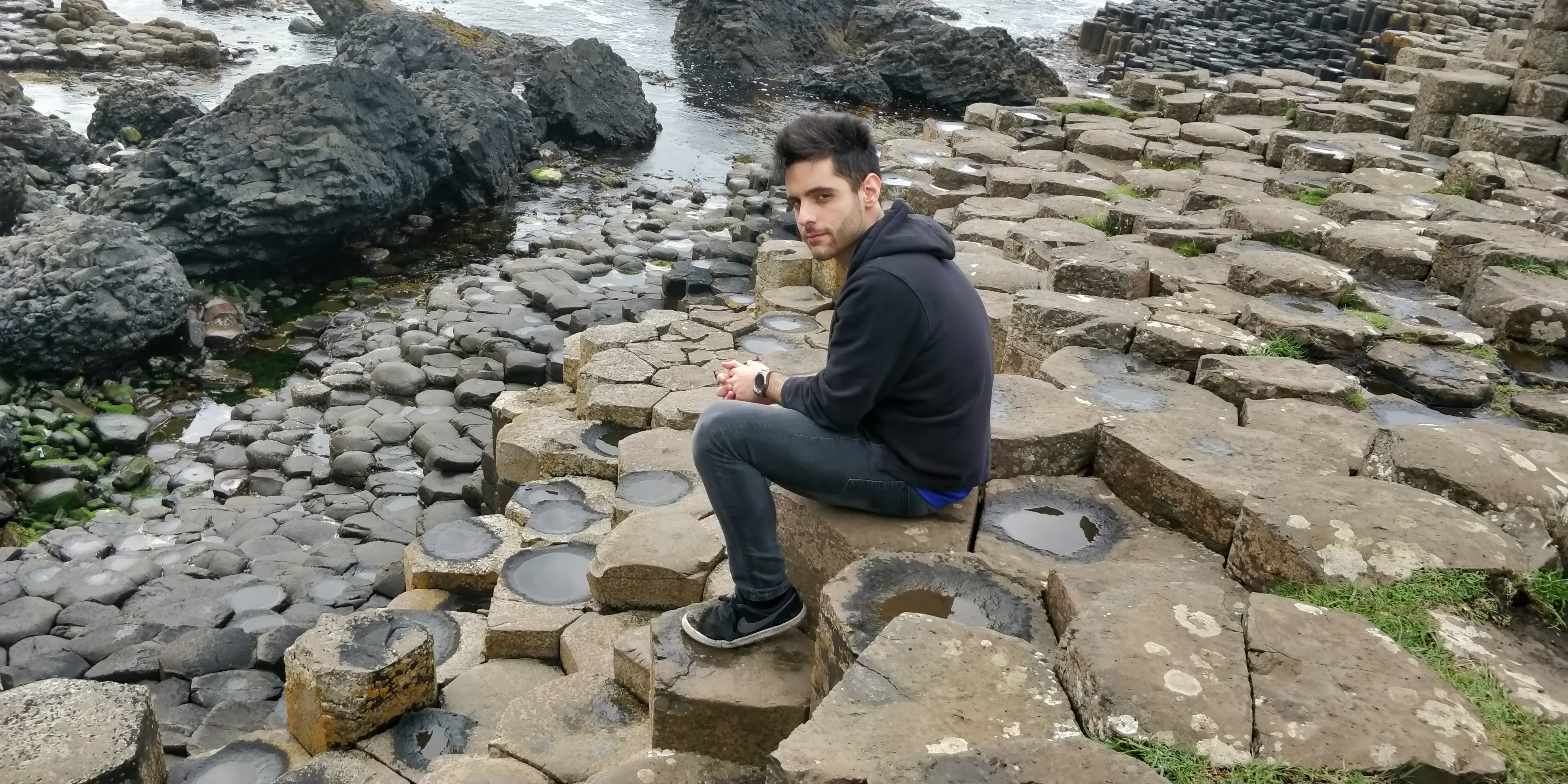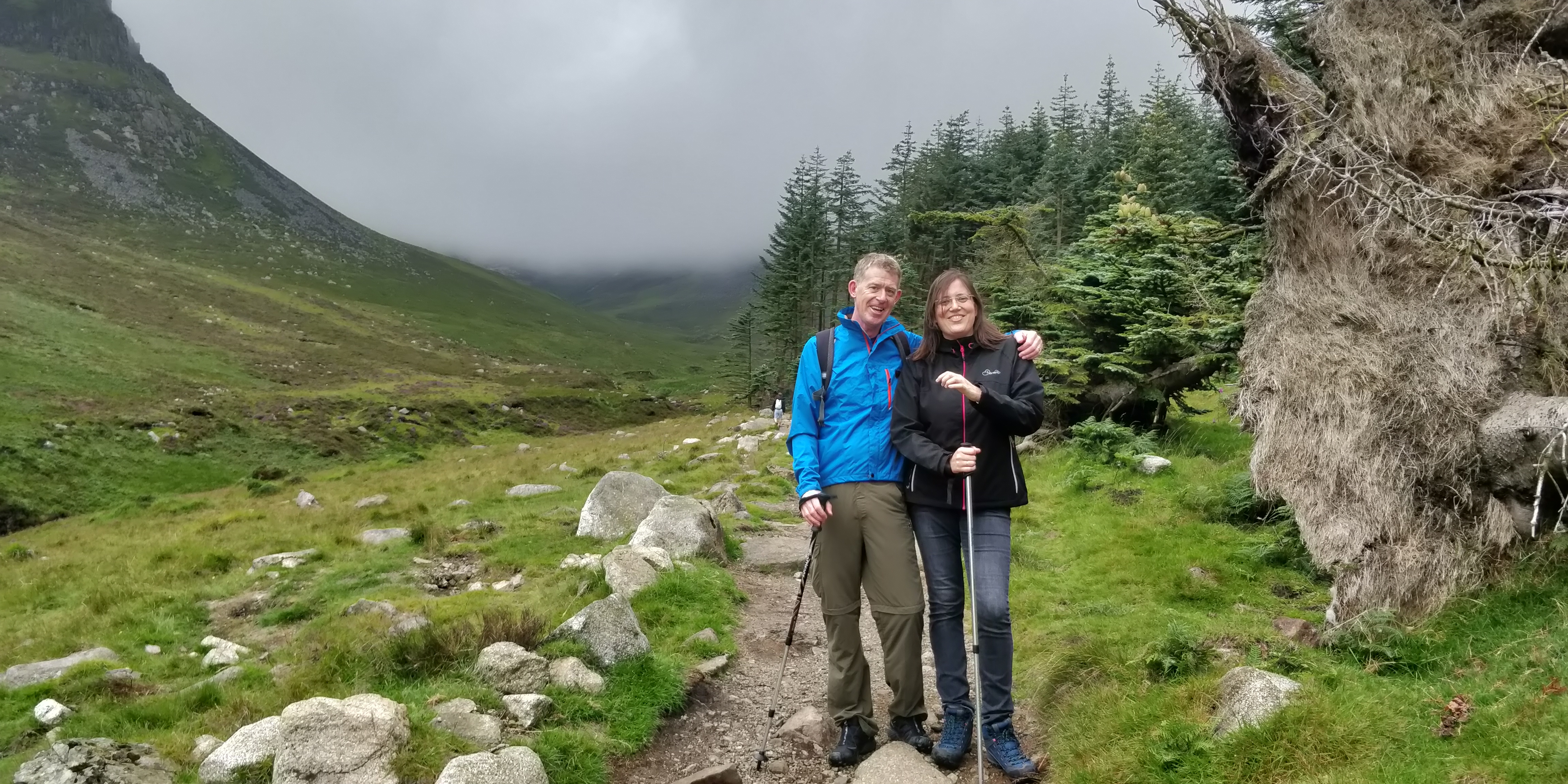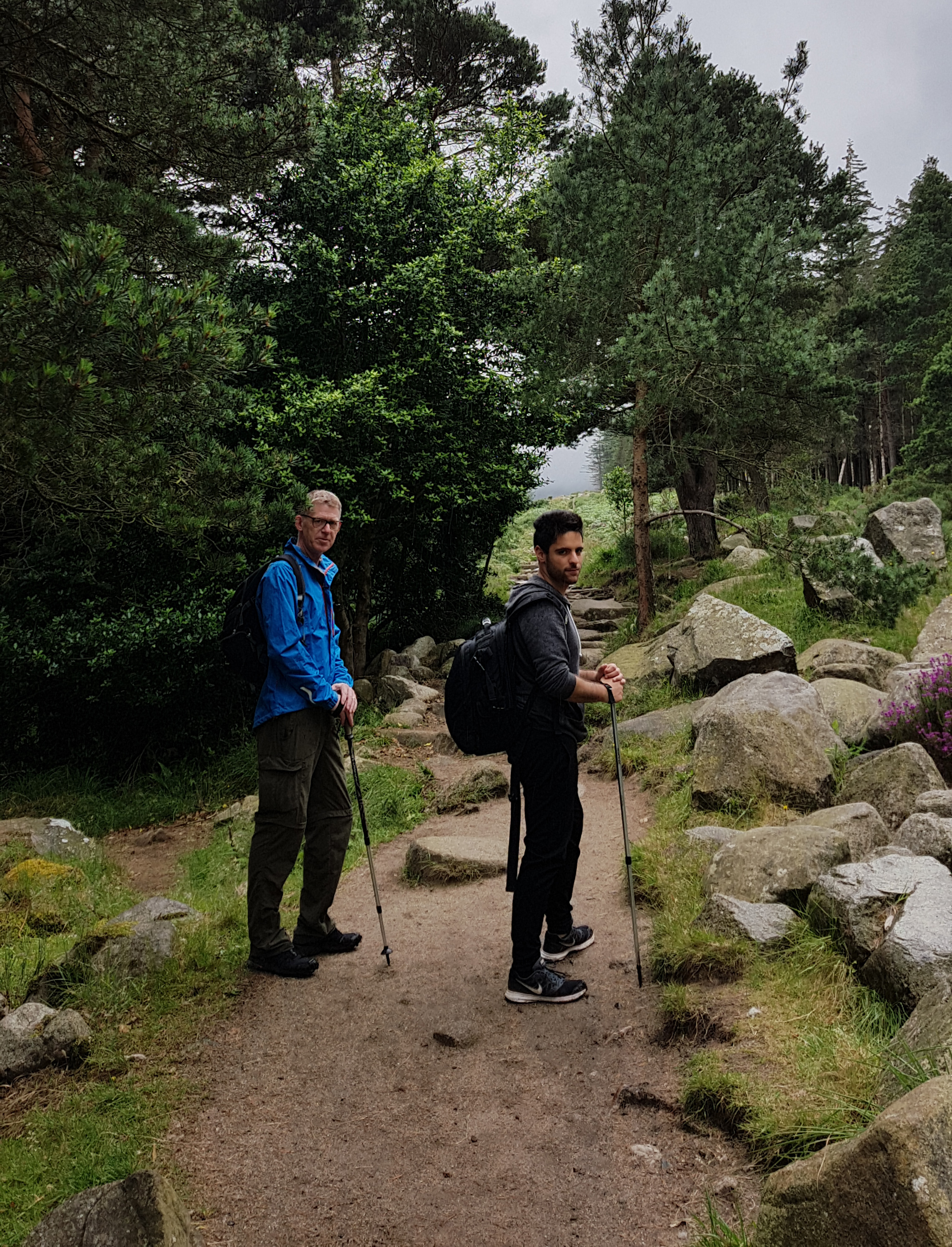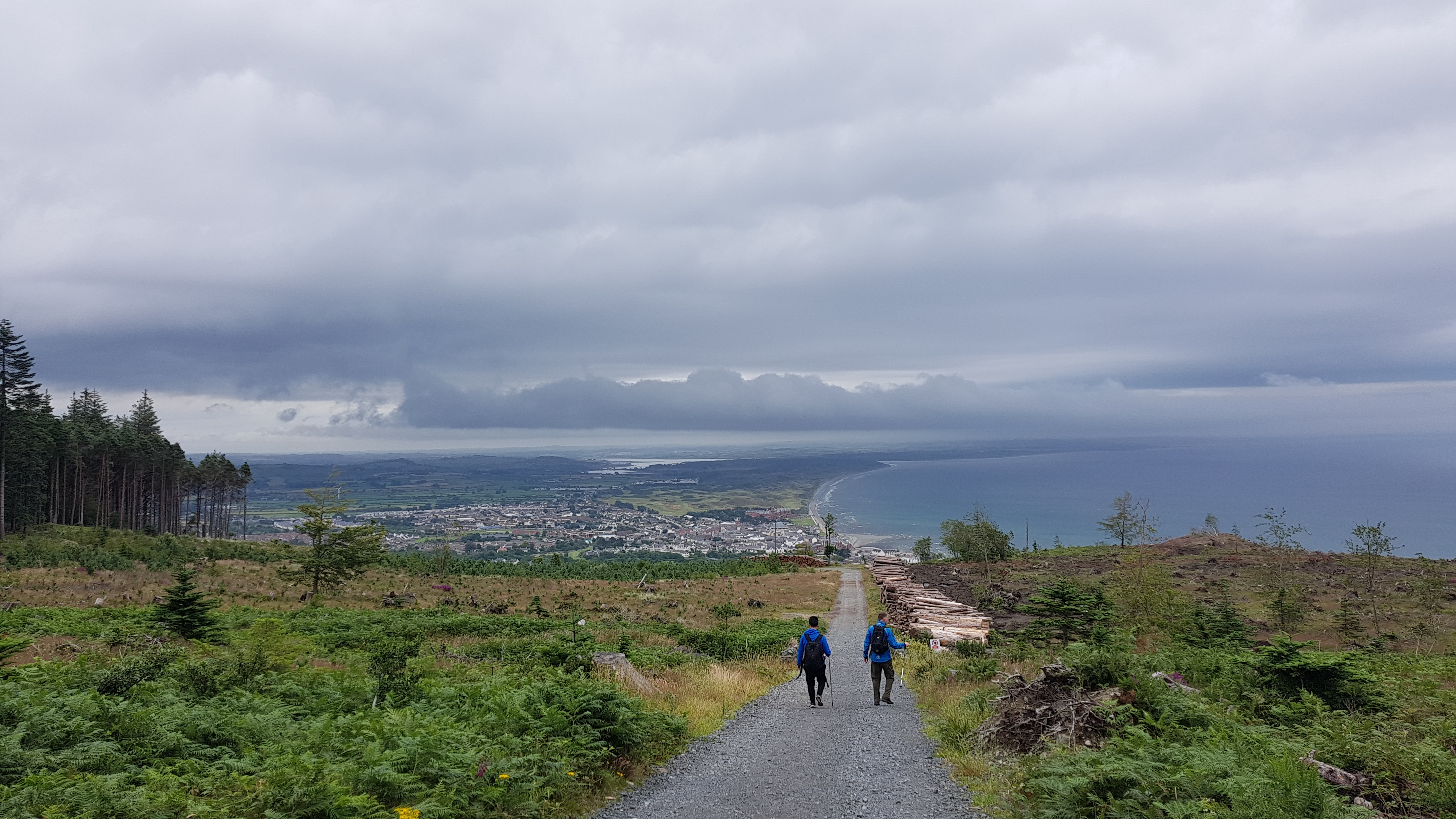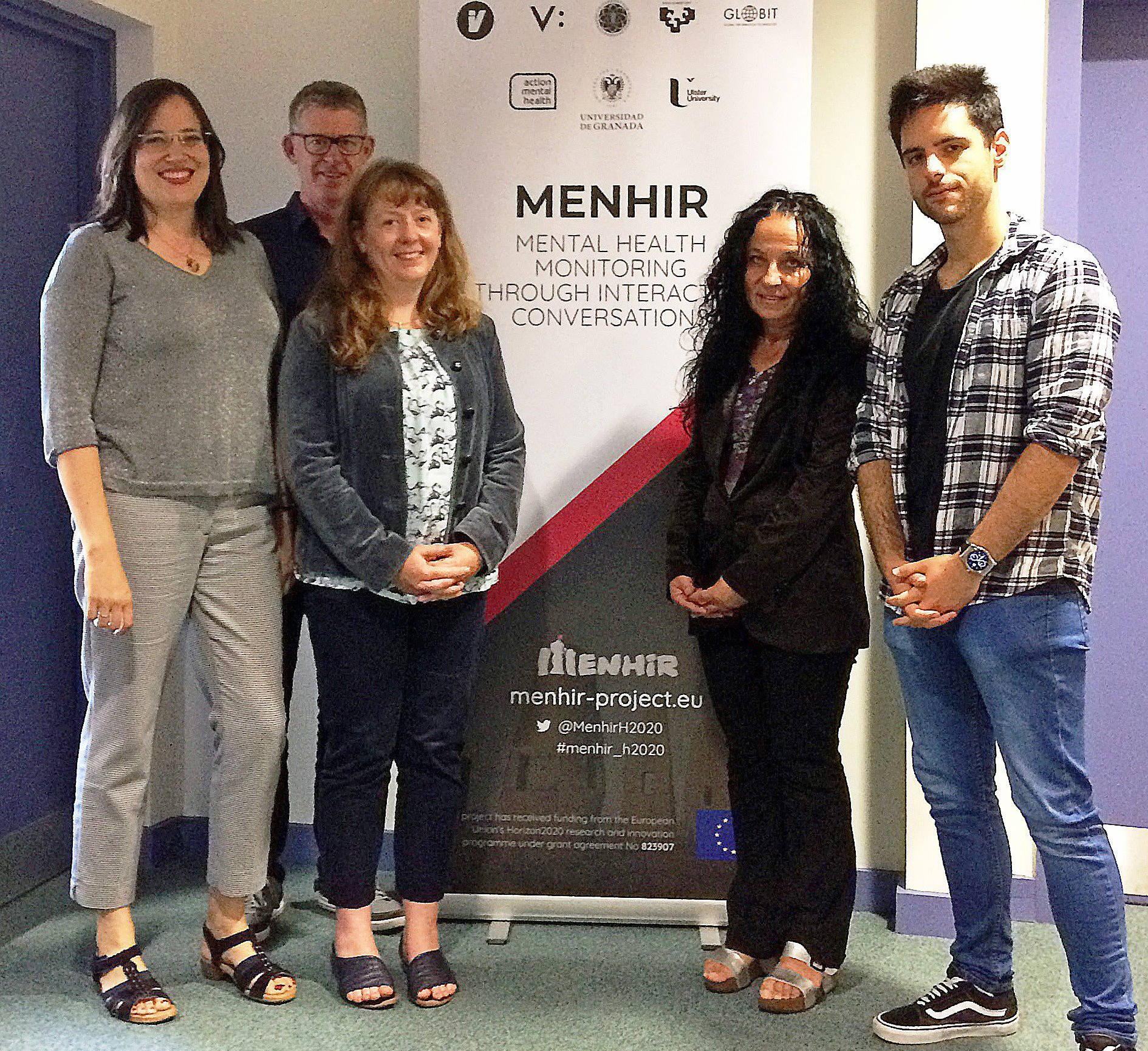Anna Esposito
Sending institution: Università degli Studi della Campania "Luigi Vanvitelli"
Receiving institution: Intelligent Voice
Secondment dates: 13th February – 1st March 2023; 27th July - 10th August 2023
Summary of the secondment work:
The goals of the Menhir project are the detection of depression through speech processing.
Speech analysis represents a promising way to detect depression; given this, with the partner of Intelligent Voice we discussed to investigate differences in the linguistic content from transcriptions of spoken interactions of depressed clinical group and healthy subjects. We took advantage of data collected during previous secondments at AMH by Claudia Greco, particularly the speech of 65 participants native English speakers from Northern Ireland. These participants were divided into two groups. Group 1: a control group of healthy subjects with no history or current conditions of any psychiatric disorders made by 30 participants (16 females). Group 2: a clinical group of 35 participants diagnosed with Major Depressive Disorder (17 females).
Participants were required to sit in front of a laptop equipped with a microphone and asked to complete the following tasks devoted to accurately recording the participants’ voice. Subjects have been asked to read out loud a brief Aesop’s fable, named “The northern wind and the sun” (hereafter referred to as the ‘Tale Task’) from the laptop monitor and then to talk about how they spent the past week, or to recount any event they consider relevant, and report for a minimum of 2 minutes (hereafter referred to as the ‘Diary Task’).
Finally, participants were required to fill in two multiple choice tests each composed of 21 questions aimed to assess their mood, the BDI-II (Beck Depression Inventory second edition): a questionnaire to measure the severity of depressive symptoms in its second edition and the DASS-21: a self-report questionnaire aimed at measuring the level of depression, anxiety, and stress.
Audio data was transcribed using Whisper, an Automatic Speech Recognition (ASR) model produced by OpenAI and perfectioned by the partner of Intelligent Voice. Whisper is the latest in a series of Convolutional Transformer End-to-End ASR models. The pretrained Whisper Medium model was used for all the automated transcriptions.
Once transcribed, the text was analyzed through the Linguistic Inquire World Count-22 software. Linguistic Inquiry and Word Count (LIWC) is a software for analyzing word use, consisting of software and dictionaries. Within the text, starting from the dictionary’s words, the software identifies and analyses target words which allows the detection of language categories that tap into a particular linguistic domain (e.g., negative emotion words). Most of the LIWC output variables are percentages of total words within a text, while few LIWC variables are: word count (WC), words per sentence (WPS), and the summary measures. WC is the raw number of words within a file. WPS is the mean number of words within each sentence within the file.
The analysis through LIWC showed, that depressed subjects compared to controls, tended to use more first-person singular pronouns (I), tended to speak less, use a more negative tone while speaking and used words related to negative emotions and anxiety. Our study also highlighted something that has not yet been observed in the literature concerning linguistic features of Depression, thus the greater spontaneity and tendency to speak “filter-free” of depressed subjects compared to healthy participants.
To accomplish the above activities my secondment work was dedicated to
a) Identify variables of interest for the linguistic analysis
b) Discuss the voice features in terms of expressiveness, naturalness, and intelligibility)
c) Revise the state of the art of current AI tools for sentiment analysis.
These discussions were made at different places and time with the colleagues (Neil Glackin, Nigel Cannings, Marvin Rajwadi, Roman Shrestha, ) from Intelligent Voices by meeting personally and remotely once in London for accomplishing appropriately the objectives described in a), b), and c).
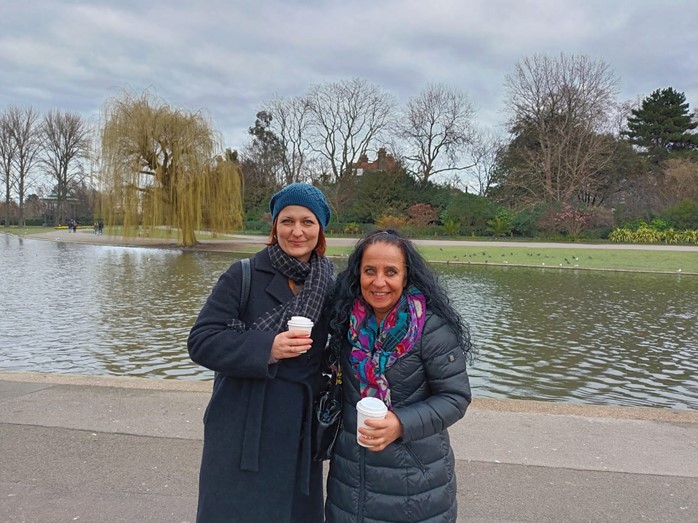
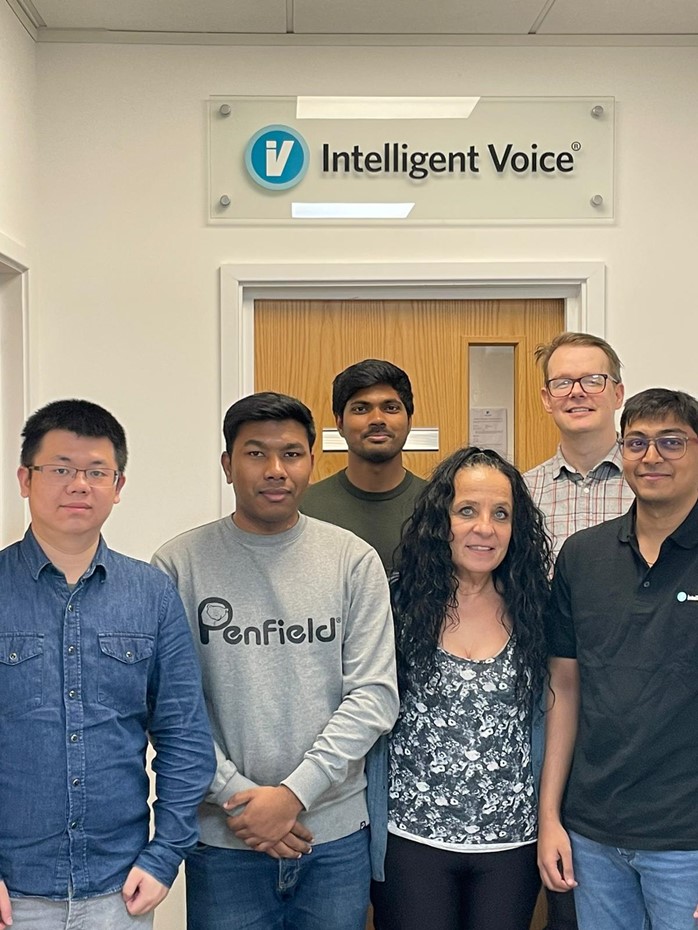
Personal notes:
I enjoyed my experience with the colleagues of Intelligent Voice with whom we have currently established a strong research collaboration I had insightful and constructive discussions with all of them which were the source of new research ideas and enriched me humanly and professionally. The discussions were always positive and interesting making, without doubts, my networking experience very rich of professional and social insights.
I also enjoyed London and had the chance to visit some very interesting places.
Claudia Greco
Sending institution: Università degli Studi della Campania "Luigi Vanvitelli"
Receiving institution: Action Mental Health
Secondment dates: 1st April – 30th June 2022
Summary of the secondment work:
The goal of the MENHIR project is to develop conversational technologies to promote mental health and assist people with mental ill health, as depression and anxiety, to manage their conditions.
In order to contribute to the research on this topic, during my secondment period in Northern Ireland I conducted a research study with the aim to identify multiple behavioural and functional features which can be associated with depressive disorders. The study focused on the features concerning the speech and the handwriting. To achieve this, Action Mental Health (AMH) was available to involve both clients and staff members into the study.
To collect vocal and handwriting data, participants were required to sit in front of a laptop equipped with a microphone and a graphic tablet. The experimental procedure consisted in four steps:
1) Reading out loud a brief Aesop’s fable, named “The northern wind and the sun”, from the laptop monitor.
2) Talking about any how they spend the past week or any event they consider relevant to report for a minimum of 2 minutes.
3) Completing some drawing and writing tasks by using the graphic tablet.
4) Filling in two multiple choice tests each composed of 21 questions aimed to assess their mood (BDI-II and DASS-21).
Participants were informed that they would be identified by a code and their name would not appear in the database. Before starting the study, participants were asked to read and sign the informed consent. All participants successfully completed the study.
The final sample was composed by 35 clients and 31 control participants, recruited among AMH staff members. In order to build a representative sample of the Northern Ireland population, the recruitment days have been organized in several AMH locations. Therefore, I had the chance to
visit and meet both clients and staff members of AMH in Belfast, Antrim, Portadown, Downpatrick, Newtownards, Derry, Newry and Fermanagh.
During my secondment period, I also participated in some events and meetings organized at the Ulster University, both in the Belfast and Jordanstown campus, as the AIRC (Artificial Intelligence Research Centre) Workshop on “Artificial Intelligence in Action Across Northern Ireland and Beyond”.
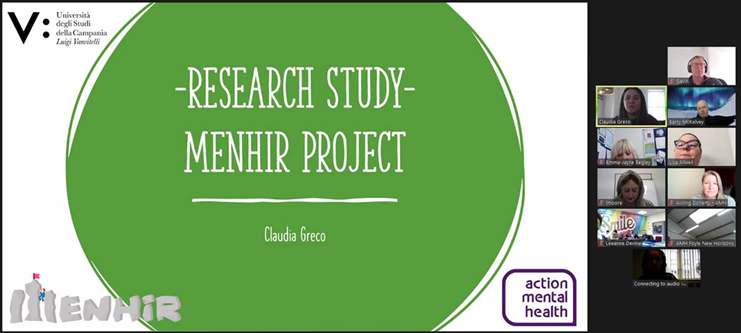
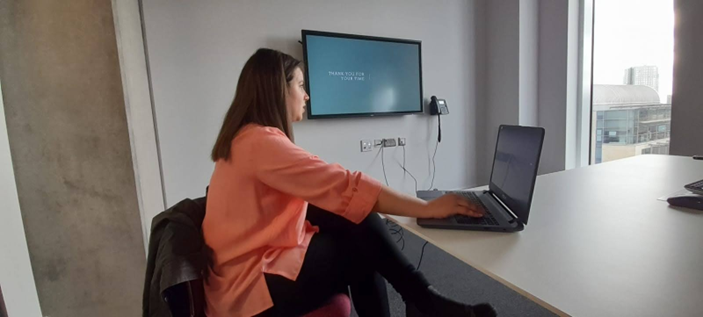
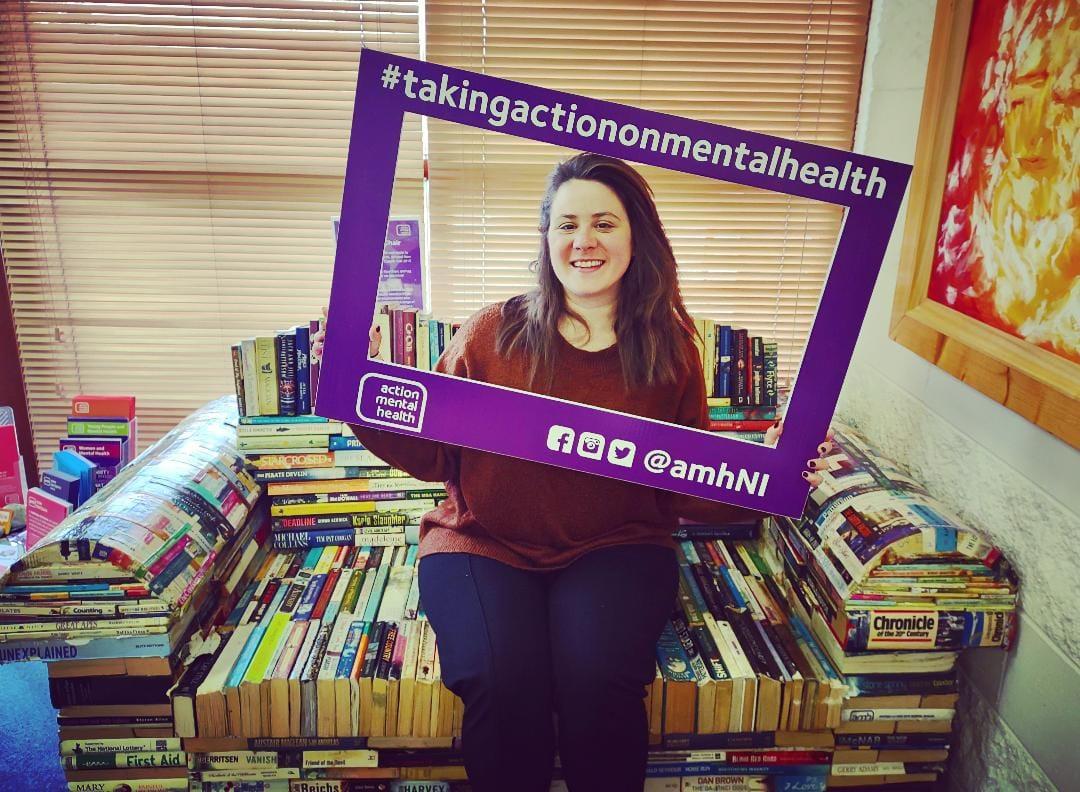
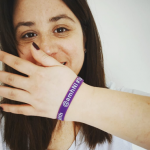
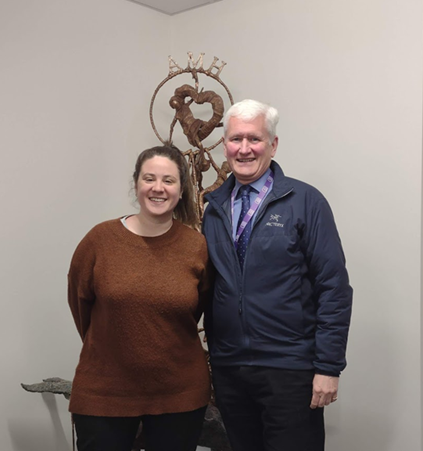
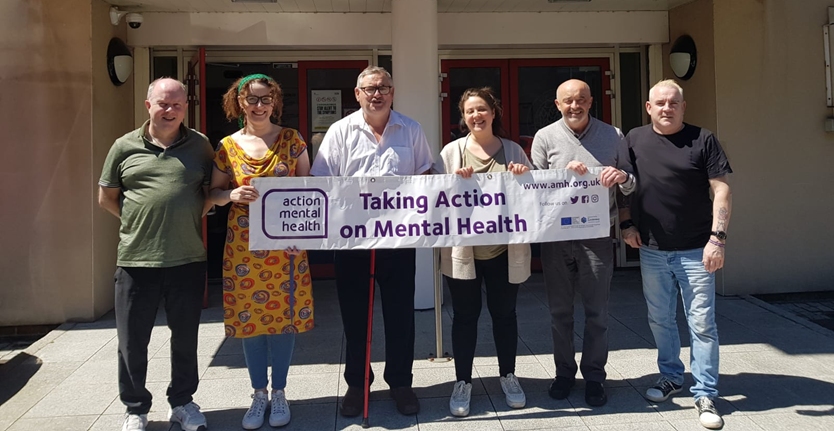
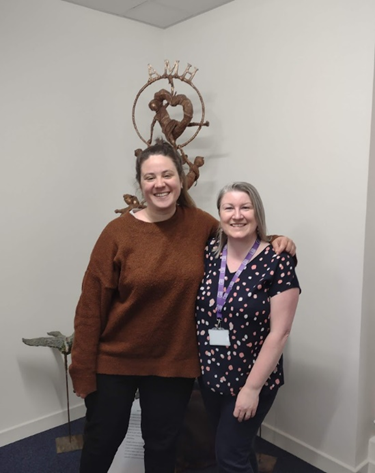
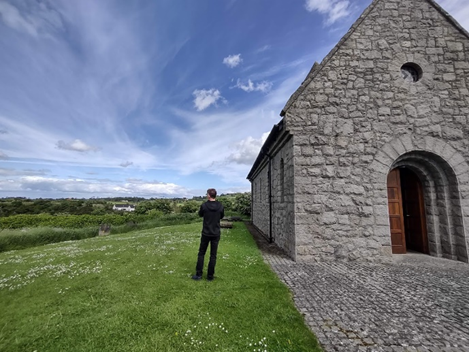
Personal Notes:
I really enjoyed my experience in Northern Ireland. First of all, NI is beautiful country with a lot of breathtaking places to explore. Moreover, all the people I met were kind, friendly and very interested in the work I was doing there. These personal notes of mine are mostly thanks to those who welcomed me and made me feel at home during my three months abroad. Special thanks go to the AMH business development manager Gavin McConvey, who supervised and supported me step by step and was always available for me. A further thank goes to the peripatetic service manager Aisling Doherty who helped me define the work program, by putting me in contact with the various AMH services and organizing the recruitment process. I would also like to thank prof. Maurice Mulvenna who included me in the various activities and events organized at the Ulster University.
Last but not least, I want to thank both the staff and the clients of AMH, who kindly decided to participate in the study and without whom the work of these three months would not have been possible. I met so many people who wanted to share their life story, enriching me both professionally and personally.
Juan Albacete Maza
Sending institution: University of Granada
Receiving institution: Action Mental Health
Secondment dates: 14th November - 13th December 2021
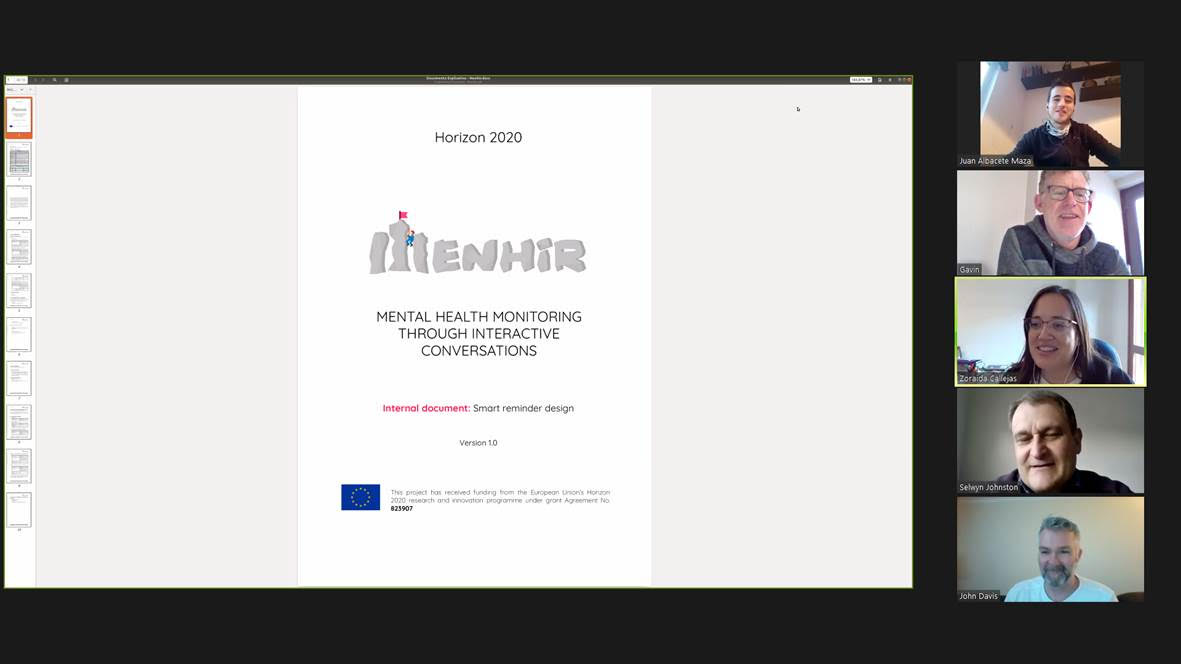
Summary of the secondment work:
During my stay in Belfast I have collaborated in the design of the smart reminders that are being worked on in the MENHIR project. Specifically, in the month that I have been in Belfast I have been able to work on organizing the decision-making process.
Smart reminders are intended to help people who want to get involved in associations and projects such as those carried out in Action Mental Health. It is one more tool that can help your recipients to carry out their personal project and achieve their goals. The main function of these reminders is to remember the activities and sessions that the client has agreed to attend, in a more interactive, motivating and automated way.
When my stay began, the Menhir team was reflecting on how to design these reminders so they can be truly supportive. Therefore, my job has been to design an adequate decision-making process. For this, the AMH coordinators were contacted, an explanatory document was prepared of the different ideas that the Menhir team had been considering, meetings were arranged with the coordinators to discuss these proposals and obtain their feedback, and two online questionnaires were prepared to continue getting feedback and clarify the priorities of those who work with clients on a daily basis, ...
Unfortunately, due to the pandemic, my work has been done mostly from home, and it has not been possible to often attend the workplace in person. The AMH prevention measures regarding Covid are very strict, and that is the way it should be. However, I am very satisfied and I believe that the work carried out has been productive.
Personal notes:
Personally, the stay in Belfast has been great. The work carried out has been very satisfactory, but also being able to get to know another country, another culture, another city and other landscapes has been great. Northern Ireland and Belfast are very charming places, with a very intense but interesting recent history and from which one learns a lot. I have been surprised by the amability and respect of the vast majority of people I have dealt with and met. Gavin McConvey deserves a special mention, who has made everything very easy for me and whom I have been able to learn more about; I have even been able to know some beautiful places thanks to him. Also Michael McTear has helped me a lot and has been very kind to me. It was a pleasure to meet you in person.
I have been able to enjoy and get to know Northern Ireland, and also improve my English somewhat, although there is still much to do…! Thank you all very much, it has been a great experience!
Mikel De Velasco
Sending institution: University of the Basque Country
Receiving institution: GLOBIT
Secondment dates: 16th January - 14th July 2020
The secondment I did at GLOBIT has been beneficial to me, as it explores the companies way of working, a way that is quite different from the academic one that I am used to.
Throughout the secondment, I became familiar with the platform that GLOBIT is developing (MENHIR-KM-EP). This platform tries to store and visualize all the data that the MENHIR proyecto has acquired.
Within the tool I have helped to define a standard mpeg7 format that helps to store the emotional information acquired in the project so that it can then be easily plated.
Before starting to work on the analysis of the emotional content, I first had to segment the recordings with the emotion annotations. With this segmentation I started the analysis of the emotional content.
Gavin McConvey
Sending institution: Action Mental Health
Receiving institution: University of Granada
Secondment dates: 24th-28th March and 24th November - 4th December 2019
As Action Mental Health are to play a central role in the MENHIR project, being involved in the recruitment and management of volunteers and hosting staff from all universities taking part in the research activity, it was incumbent me as the AMH representative to engage with the Universidad de Granada at an early stage to establish AMH responsibilities. Allied to this was a wish to gain a fuller understanding of the research and the particular aspects that would inform the development of activities required at the various stages of the research.
The MENHIR project will research the use of conversational technologies to assist people with anxiety and/or depression to monitor and manage their conditions.
The secondment to Universidad de Granada for me had 3 functions
- AMH’s role in the research
- Understanding aspects of the research to aid in the development of the technology.
- Working with other university researchers to identify support required for various (yet unknown) aspects of the project.
To date my learning curve has been immense. Conversational analysis, emotional analysis, perceptual analysis, synthetic voice experiments, proactive dialogue systems, data management, research ethics are just a few of the new subjects that I am trying to get to grips with.
The challenges are vast; to get to a level of understanding that best supports the project but also enhances the researcher experience of those involved has required enormous effort.
Hearty thanks to Zoraida and Antonio and the staff at Universidad de Granada to the warm welcome and support throughout.
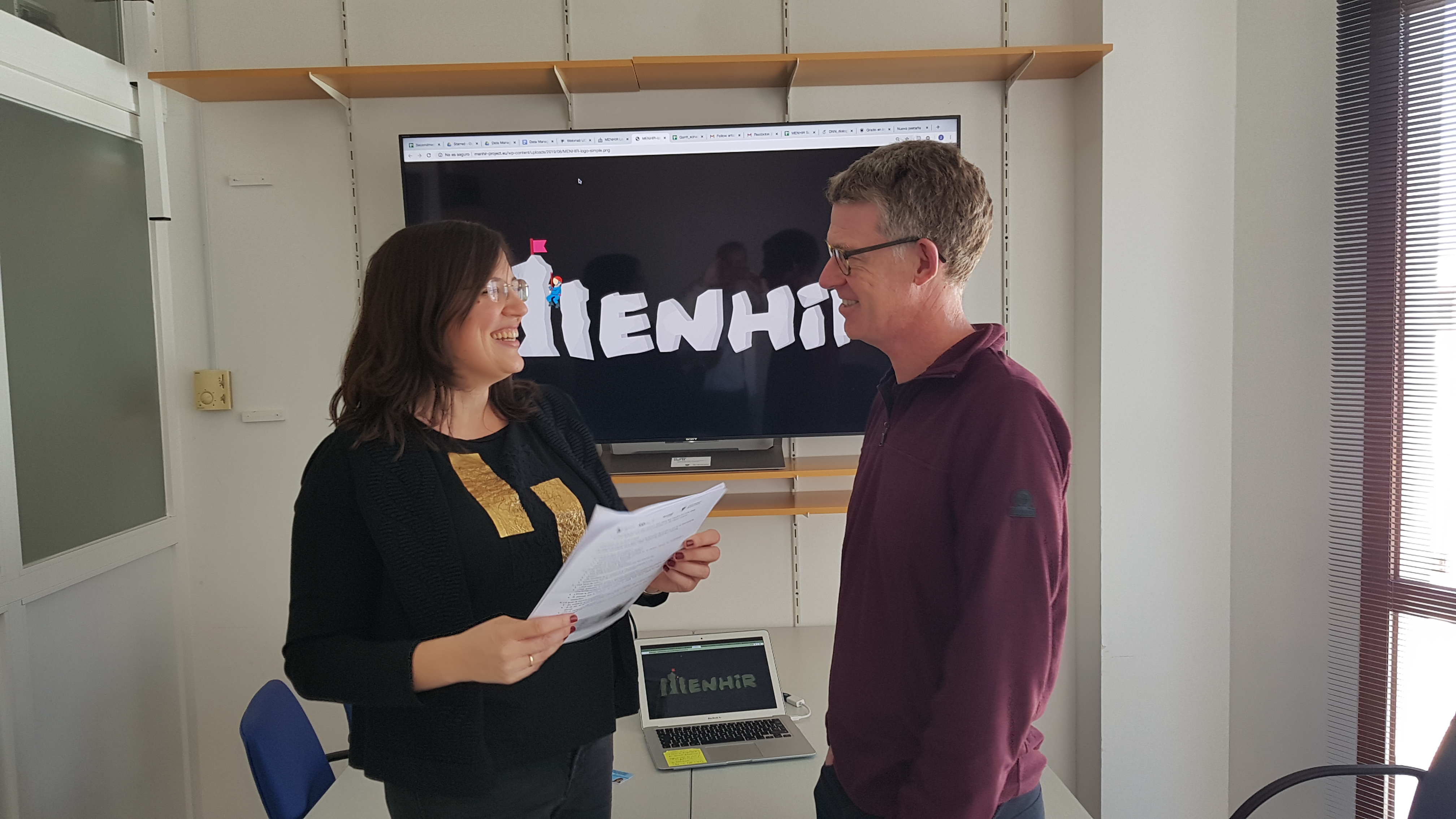
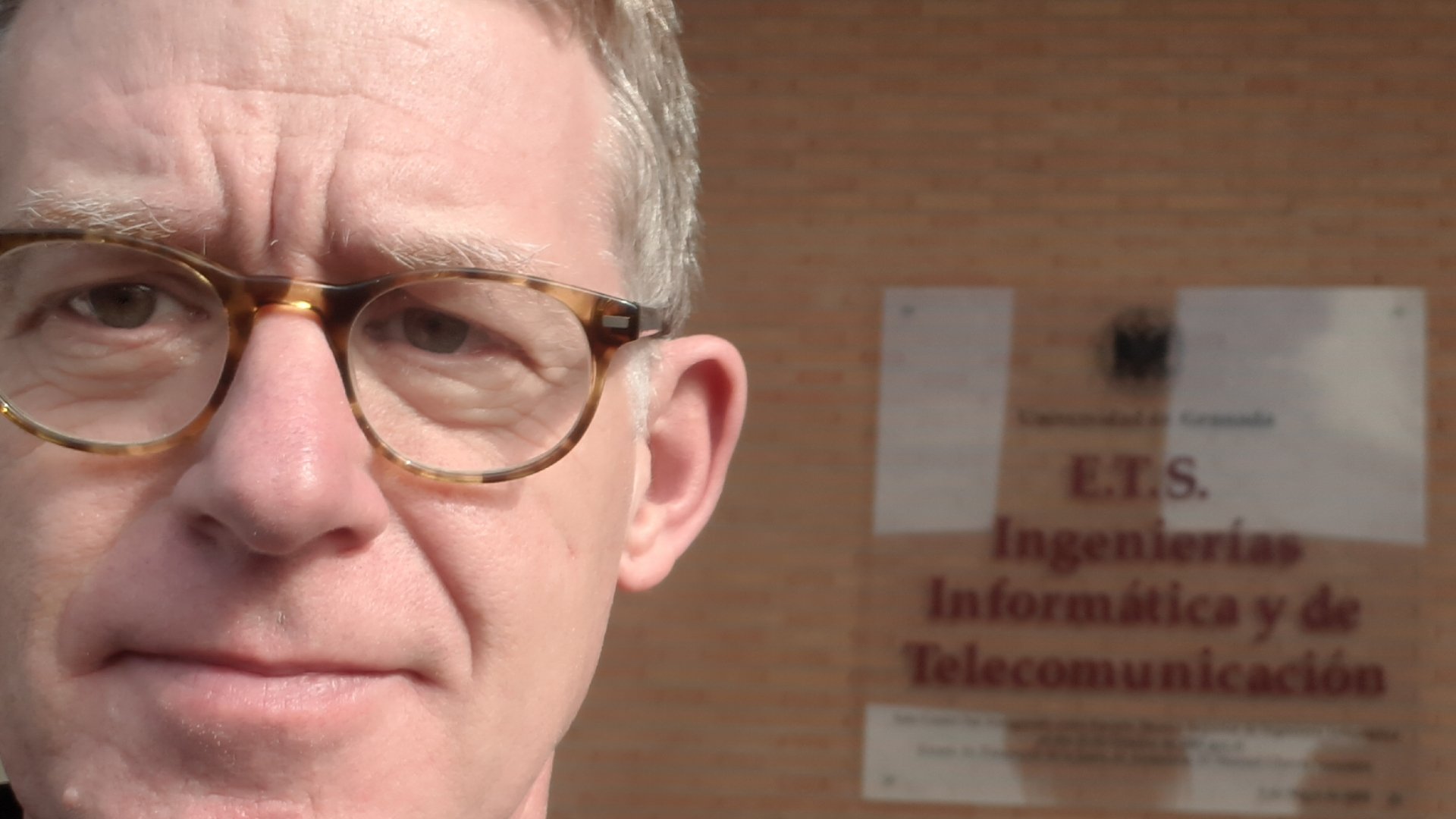
Terry Amorese
Sending institution: Università degli Studi della Campania "Luigi Vanvitelli"
Receiving institution: Action Mental Health
Secondment dates: 23rd July - 27th November 2019
Summary of the secondment work:
Since MENHIR final conversational system would be a speaking chatbot, during the secondment have been tested perceptual features of synthetic voices in terms of user acceptance, requirements and expectations. In a first stage, six synthetic voices (male and female voices) have been developed, using three free online synthesizers providing synthetic English speech. The three synthesizers were: From Text To Speech, Natural Reader, and Oddcast. Each synthesizer provided two synthetic voices (one male and one female) for a total of 6 stimuli. Each voice produced the sentence: “Hi, I am sure today will be a nice day, not matter it is raining or sunshine”. Each synthetic voice has been assessed in terms of pragmatic, hedonic, and attractive dimensions, as well as in terms of intelligibility, expressiveness, and naturalness through the English versions of the Virtual Agent Voice Acceptance Questionnaire (VAVAQ), developed at UVA. In a second stage, meetings were organized with AMH clients, in order to make them aware about MENHIR project features, and to ask them to join the perceptual experiment. Once obtained clients’ consent in joining the study, several workshops have been arranged in which participants were asked to listen to the six synthetic voices and after each voice fill the questionnaire aimed at collecting information about their willingness to interact with the voices and their opinions about them. A total of 40 participants were involved, among these 21 AMH Clients and 19 among AMH staff members, New Life Counseling staff members and members of the Royal College of Psychiatrists.
During the secondment period, I’ve been also involved in the organization of MENHIR recorded interviews. In order to analyze whether speech patterns (for example, volume, tone, intonation) can be linked to mental wellbeing, were audio recorded conversations between AMH clients and counselors from New Life Counseling. Before starting the interviews, has been necessary to set up all the materials and documents used to conduct the interviews, test the appropriateness of the setting and the functioning of the tools such as the microphone and the laptop. Moreover, training sessions were organized in order to allow NLC counselors to familiarize with the interview’s procedure, described below: counselors asked clients to answer to some general questions (for example:” What did you have for breakfast?” and “How did you get here today?”). Then, clients have been asked to answer to the items of the Warwick-Edinburgh scale trying to expand their responses, in order to talk about their general mental wellbeing state. At the end of the conversational stage, participants were also asked to read a short calibration text: “The boy who cried Wolf! Wolf!”. I’ve also been involved, as interviewer, in recordings which have been carried out with a control group of students from Ulster University in Jordanstown.
Personal notes:
The secondment experience in Action Mental Health meant a lot for me, I was welcomed in a very professional but at the same time friendly working environment. Despite being so far from home, I didn't feel like a stranger, I was immediately involved in AMH activities and everyone was very kind and helpful. I have to thanks in particular AMH business development manager Gavin McConvey, working with him has been instructive and fun. I also have to thank Professor Maurice Mulvenna and Dr. Raymond Bond from Ulster University, although we had worked together just for a little, it was still very interesting. This experience has been so positive that next year, in September, I will go back to AMH for other three months of secondments as ESR. Once finished the secondment period, I’m planning to stay in Belfast at least other three months, in order to conduct research concerning my PhD thesis.
Paul Mc Kevitt
Sending institution: Ulster University
Receiving institution: GLOBIT
Secondment dates: 20 August - 20 September 2019
Summary of the secondment work:
We discussed MENHIR Work Package WP2 ("Needs and user experience analysis for chatbot-based mental health monitoring'') and Deliverables D2.1 ("Chatbot strategy for mental health monitoring") & D2.2 ("Characterisation and analysis of human-to-human interaction''), with Ulster as Lead Beneficiary. MENHIR WP1 (Project monitoring & management) and WP3 ("Cross-modal analysis of interactional exchanges''), with Granada (UGR) & Bilbao (UPV) as Lead Beneficiaries respectively, were also discussed, and particularly the MENHIR Data Management Plan (DMP) in relation to the Project Management Plan (PMP).
I reviewed & commented upon the MENHIR Data Management Plan (DMP) Draft document, prepared by Prof. Dr. Michael Fuchs. The DMP outlines how research data is handled during and after the MENHIR project is completed and discusses the following questions: (1) What data will be collected, processed or generated during the MENHIR project? (2) Following what methodology and standards? (3) How will it be curated and preserved?
I read the following MENHIR draft papers, (1) "Integrating speech analytics into smart speakers and chatbots to monitor mental health, mood and well-being: Challenges and opportunities’’& (2) "Co-creating requirements and assessing end-user acceptability of a voice-based chatbot to support mental ill health: A thematic analysis of a living lab workshop’’.
We conducted a MENHIR Networking visit to FTK (Forschungsinstitut für Telekommunikation und Kooperation), Dortmund and met FTK colleagues, Prof. Dr. rer. Nat. Dominic Heutelbeck & Dipl.-Kff. Jana Mertens. MENHIR research work was discussed with Prof. Dr. Heutelbeck including his area of expertise in Distributed Computing, Computer Security and Reliability and Computer Communications (Networks).
Personal note:
I found the opportunity for MENHIR secondment to GLOBIT very beneficial as it provided a professional and friendly working environment. As always, they were great hosts, where we visited the following WunderBar restaurants: "Krone" ("Crown") & "Schützenlock" ("Foxhole"), near The Rhine, "Steinschloesschen" ("Small Stone Castle"), Odenwald and "Cafe Liebig", Pfungstadt. Also, the town of Pfungstadt has everything you need, including its own Brewery ("Pfungstädter"), with Pfungstädter "Brauereigasthof" restaurant, and "Malzfabrik Rheinpfalz" ("Malthouse"). There were also opportunities to attend the Pfungstaedter Beer Festival, 6-8th September, which reminded me of the "Oktoberfest" (Munich).
During the Secondment, I learned the importance of a project Data Management Plan (DMP), determining how research data is handled during and after a project is completed. This has become more important due to EU General Data Protection Regulation (GDPR) (2016) and the recent emphasis on the ethics of AI. It was Burg Frankenstein in the Odenwald ("Müehltal") near Pfungstadt which inspired our recent research paper publication (March, 2019), "Digital empathy secures Frankenstein's monster''.
Raymond Bond
Sending institution: Ulster University
Receiving institution: GLOBIT
Secondment dates: 14 - 21 August 2019
I met with my two PhD students to discuss our two MENHIR papers together. I read more about chatbots and indeed their ethical challenges surrounding imitating humans, anthropomorphism design choices, utilitarianism, human-centred AI, CASA theory and the uncanny valley theory as applied to voice/smart speakers. I met with Globit and discussed data governance and data storage. We discussed architectures and knowledge management.
Raquel Justo and María Inés Torres
Sending institution: University of the Basque Country
Receiving institution: GLOBIT
Secondment dates Raquel Justo: 17th July - 15th August 2019
Secondment dates María Inés Torres: 28th July - 15th August 2019
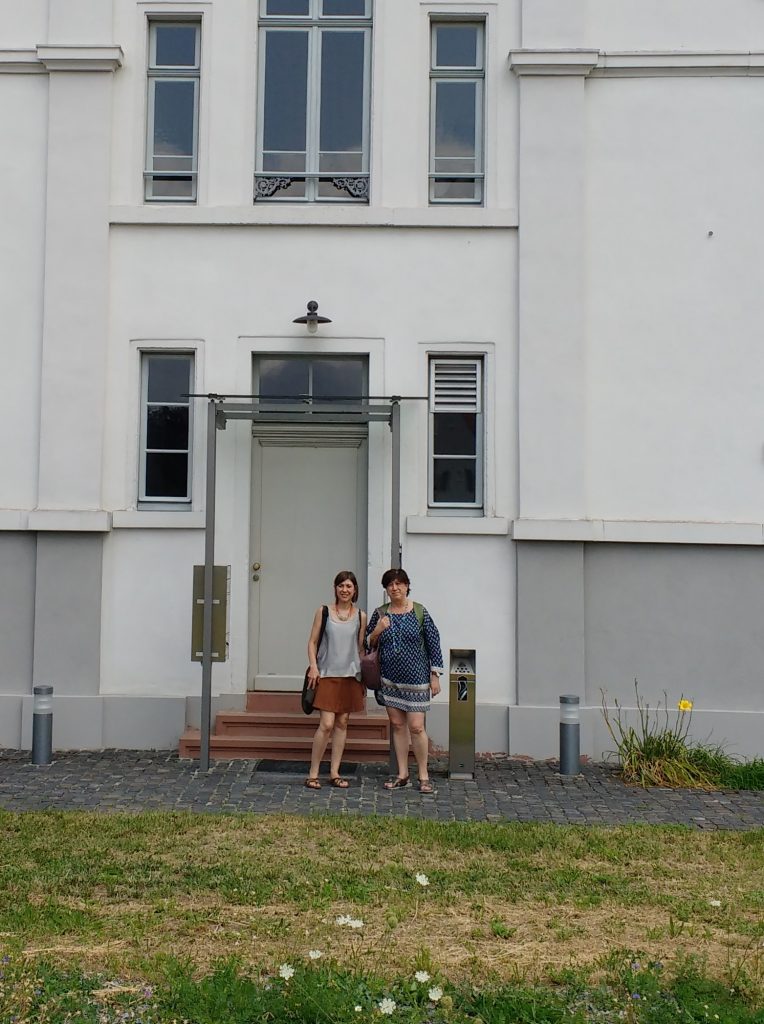
A report on the secondment can be found here:
Frederick Booth
Sending institution: Ulster University
Receiving institution: GLOBIT
Secondment dates: 1 - 15 August 2019
During the secondment Mr Turkington and myself were tasked with providing initial drafts of two papers based on the Deliverable document. This work was undertaken as part of Work Package 2 - "Needs and user experience analysis for chatbot-based mental health monitoring”. Whilst both participated in these tasks, each participant took the lead on a specific paper. Mr Turkington lead on "Co-creating Requirements and assessing acceptability with end-users for a voice-based chatbot to support mental health: A Thematic Analysis" and I on "Towards integrating speech analytics into smart speakers and chatbots to monitor mental health, mood and well-being: Challenges and Opportunities"
Towards the end of the secondment, we discussed with GLOBIT the content of both papers and to exchange ideas.
Marialucia Cuciniello
Sending institution: Università degli Studi della Campania "Luigi Vanvitelli"
Receiving institution: GLOBIT
Secondment dates: 1 July -30 August 2019
1st week: During the first week I met GLOBIT employees. Starting from the concepts derived from the project, I focused on depression and anxiety, in particular on the symptoms that the two disorders have in common. The MENHIR project aims to research and develop conversation technologies in order to help people with depression and anxiety manage their conditions or difficulties, using more realistic, natural and smart interactions.
2nd week: I illustrated my role and the idea that could be developed within the MENHIR project in a presentation, under the supervision of my Professors Anna Esposito and Gennaro Cordasco. My role:
- to learn more about how to define and specify health care platforms for mental health services.
- to improve the quality of the life of people affected by depression and anxiety disorders through the support of an automatic dialogue system.
As previously mentioned, I focused on the symptoms that anxiety and depression disorders have in common (nervousness, irritability, sleep disorders and concentration problems) selecting sleep disorders among them. Different events can cause anxiety and depression, for example a layoff or an unexpected grief; these events can elicit feelings of anxiety, nervousness, sadness, fear and loneliness. All of them represent normal reactions to daily stress. The depressed subject experiences these mental states every day, without any motivation and this does not allow him to take care of himself and his family and prevents him from a good job performance.
3rd week: The purpose of the third week was to explain the reason for the importance of studying sleep disorders, the results of this research have produced the following motivations:
- a diagnosis of depression in the absence of sleep may not be exact.
- sleep disorders can be the reason why depressed people consult a specialist for the first time.
- there is a high risk of relapse and recurrence if other symptoms improve and sleep disorders persist.
For a long time, insomnia was seen as a symptom of psychic difficulty rather than one of the causes. Helping people sleep better could be an important first step in dealing with psychological and emotional problems.
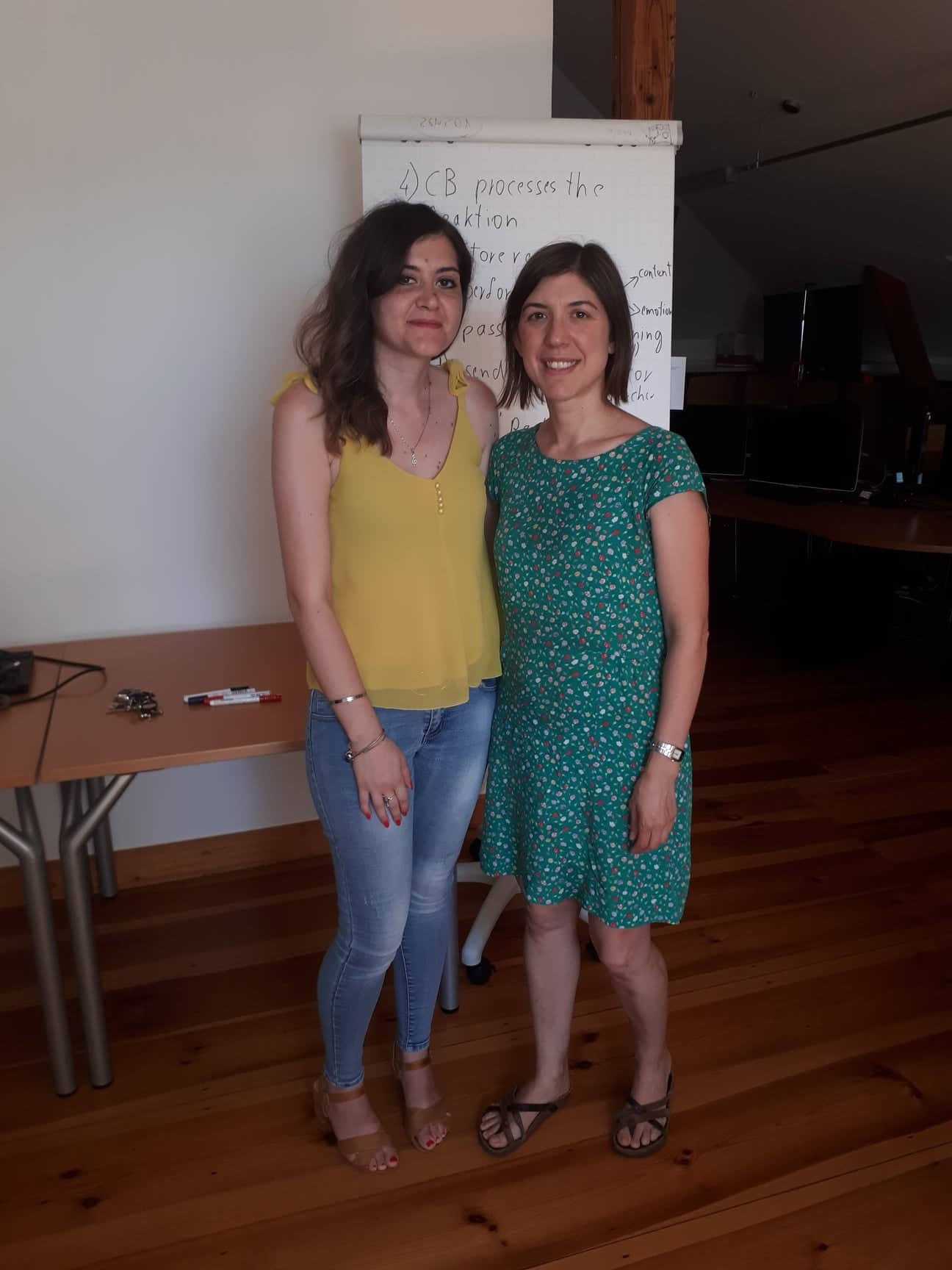
4th week: I met the researcher Raquel Justo of Universidad del País Vasco UPV / EHU (UPV). During the meeting, the GLOBIT team showed us, through different phases, what a chatbot can do, highlighting the most important steps.
5th week: I focused on therapies that have proven most effective in treating sleep disorders in order to understand how to create a dialogue structure for the chatbot learning. Cognitive behavioural therapy for insomnia (CBTI) is an effective and non-pharmacological treatment of primary insomnia. It is recognized as a first-line treatment for insomnia by the Consensus Statement of the National Institutes of Health (NIH) and by the British Association of Psychopharmacology. CBTI is an effective treatment for chronic insomnia associated with depression and also leads to significant post-treatment improvements in depression.
6th week: I was given material to study and investigate about chatbots and some useful links to see some types of chatbots:
- https://woebot.io/ Woebot - Your charming robot friend who is ready to listen
- https://dialogflow.com/ - Google Dialogflow
- https://www.youtube.com/watch?v=MSjW0wqu2Ck - Babylon AI Event June 27th 2018 Alexa demo
- https://www.youtube.com/watch?v=Y8NkwQLo-6o - The most powerful AI for healthcare - Babylon Health
- https://www.babylonhealth.com/ - Online Doctor Consultations & Advice | Babylon Health
- https://www.wysa.io/Wysa - your 4 am friend and AI life coach
7th week: there was a meeting organized by GLOBIT in which other secondees from Ulster University took part.
Last week: taking into consideration the initial outline of the working plan, we discussed the secondment results and what remains to be solved
Anna Esposito
Sending institution: Università degli studi della Campania “Luigi Vanvitelli” (UVA)
Receiving institution: Action Mental Health
Secondment dates: 25-29 June 2019; 06-30 July 2019
Summary of the secondment work:
The goals of the Menhir project is the detection of depression through speech processing aiming at:
1) automatically discriminate between depressed and healthy subjects and
2) automatically discriminate among different degree of depression (e.g. typical, mild, moderate, severe)
3) define the model of an automatic speaking system able to provide a first support through dialogue in the while contacting doctors or caregivers in the emergency
To reach these goals there is a need to collect data and Action Mental Health (AMH) was available to involve patients and counsellors while Ulster University provided control people. A part for getting the subjects’ involvement there is also the need:
i) define the recordings procedures
ii) revise the state of art on signal processing
iii) planning the work of Early stage researchers.
To accomplish the above activities my secondment work was dedicated to
a) describe an experiment to test the synthetic voice features the system must show (in terms of
expressiveness, naturalness, and intelligibility) in order to engage patients and counsellors
b) revise the state of the art on the acoustic and psycholinguistic speech features that have been shown to
inform about depression;
c) meet with AMH, and Ulster University partners as well as the Coordinator of the project, professor Zoraida Callejas Carrión (I had the fortune to have her doing her secondment in Belfast at the same time) to discuss the appropriate steps to do for accomplishing the objectives described in 1), 2), and 3).
Personal notes:
I enjoyed my experience in Action Mental Health and to this aim I want to thank the AMH business development manager Gavin McConvey, and the chief executive David Babington. I had insightful and constructive discussions with the coordinator, professor Zoraida Callejas Carrión which suggested new research ideas and enriched me humanly and professionally. I had positive and interesting discussions with Maurice Mulvenna and Raymond Bond from Ulster University. I can say without doubts that this networking experience was rich a professional and social insights.
Zoraida Callejas
Sending institution: Universidad de Granada
Receiving institution: Action Mental Health
Secondment dates: 1 June to 31 July 2019
MENHIR is a research and innovation staff exchange (RISE) project with a very multidisciplinary spirit. The secondment in Action Mental Health (AMH) has been an unique opportunity to expand my knowledge about mental health service providing. It is in the DNA of MENHIR to put the users in the center to co-create and co-design the technology. This requires that partners with a technical background as it is my case, understand the users, their needs and how experts as AMH are helping them.
During the secondment, I was involved in acquiring an understanding about AMH action plans, the systematic way in which they are helping people who suffer from anxiety and mild depression. I was thrilled by the amazing work and wonderful team at AMH, I could visit services all over Northern Ireland and meet their clients, I would like to make special mention to AMH New Horizons in Newtonards and to David Babington, Gavin McConvey, Selwyn Johnston and all the wonderful people from which I have learned so much. Also to
During my stay, we prepared a co-creation workshop so that the technology studied and developed in MENHIR is designed together with persons with mental ill health, experts and caregivers. In this workshop we had a discussion group on several topics, including: strengths, limitations, useage, pros and cos for the particular field of mental health, the kind of conversations that would be useful, whether they would personally use a chatbot, what features it should include, etc.
The workshop was prepared in collaboration also with Ulster University, and I had the opportunity to work with Maurice Mulvenna, Raymond Bond, Edel Ennis and colleagues to perform the thematic analysis of the results of the workshop, which allowed identifying the use cases and functional and non-functional requirements for the conversational technology developed. These results were presented in Deliverable 2.2 and the paper "Co-creating requirements and assessing end-user acceptability of a voice-based chatbot to support mental health: A thematic analysis of a living lab workshop" by Antonio Benítez-Guijarro, Raymond Bond, Frederick Booth, Zoraida Callejas, Edel Ennis, Anna Esposito, Matthias Kraus, Gavin McConvey, Michael McTear, Maurice Mulvenna, Courtney Potts, Louisa Pragst, Robin Turkington, Nicolas Wagner and Huiru Zheng (IWSDS 2020).
In this period other researchers visited AMH, and I was lucky to work closely with Anna Esposito, Manés Torres and Terry Amorese in the definition of the data acquisition protocol of the MENHIR corpus.
During the two months I was also working in the definition of MENHIR Dissemination and Communication plan, worked hard to provide extra content to the website and started our social networks (twitter, researchgate...) and prepared the General Assembly and Steering Commitee meetings.
For all the task described I had the great help of Antonio Benítez, ESR from University of Granada who was also on secondment to AMH in that period.
A personal note
Many people made the secondment such an enjoyable experience, I would like to give HUGE THANKS to Gavin McConvey for being such a great host and teaching me so much.
Extensive thanks to the AMH team, for the warm welcome and sharing their knowledge and experience. Also to New Life Counselling who also gave us very helpful feedback and nice shelter in some rainy days 😉
I would also like to thank Raymond Bond, Maurice Mulvenna and Ulster University colleagues for their brilliant ideas in the interesting meetings.
Very big thanks to Mike and Sandra McTear who always make me feel like home.
Thanks to Jane Zheng and Haiying Wang for taking me to China inside Northern Ireland.
Warm thanks to my colleagues of adventure in Belfast, Antonio Benítez and Anna Esposito for sharing so many good moments profesionally and personally.
Antonio J. Benítez
Sending institution: Universidad de Granada
Receiving institution: Action Mental Health
Secondment dates: 27 April to 26 July 2019
I am Antonio Javier Benítez Guijarro, and during my secondment I participated as computer science junior researcher.
My Fellowship period took place in Belfast (Northern Ireland, UK) at the Action Mental Health New Horizon offices, where I was immediately welcomed as part of the team discovering how their staff worked hand by hand with all the clients related with the project. During the first month of my secondment I was responsible of understanding the main needs of people with mental ill health in order to learn and transcribe to the rest of our partners how we should design and address a project that could support clients improve their wellbeing and at the same time help professionals (counselors, psychologist and staff working with this clients) to develop their activities using the outputs of this project. During this first month I visited many services around Northern Ireland, in order to interview the staff in charge of each center. With this I made a summary of their work methodology and what were the needs of both the patients and the counselors who worked there every day.
Throughout the rest of my secondment I worked next to Zoraida Callejas, Gavin McConvey, Anna Esposito and other components of the project designing the requirements that the project will cover, the public image, public dissemination, website, social media of the project and we designed the preliminary plan of the project.
I am very grateful to Prof. Zoraida Callejas, Gavin McConvey, Prof.Anna Esposito and the whole staff for making my training period at MENHIR enjoyable and memorable as I couldn’t imagine before, because thanks to them I learnt a completely new way of thinking and working, understanding the importance of achieving value not only at the level of technology, intervention or people care, but also at the level of patient and population.
This was a unique experience that enriched me from both a professional and a personal point of view creating tons of amazing memories and friendships that I will never forget.
Michael Fuchs
Sending institution: GLOBIT
Receiving institution: Ulster University
Secondment dates: 24 February to 23 July 2019
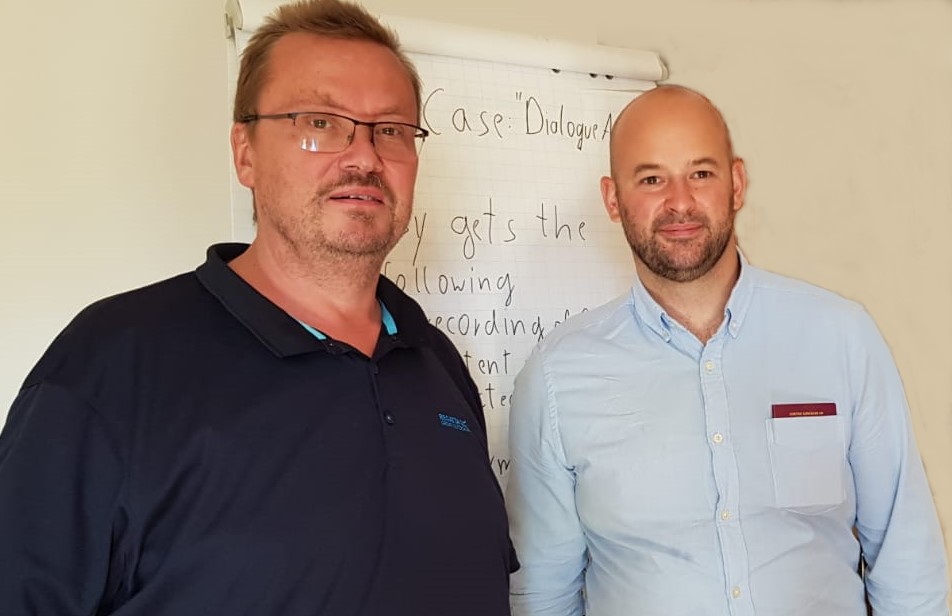
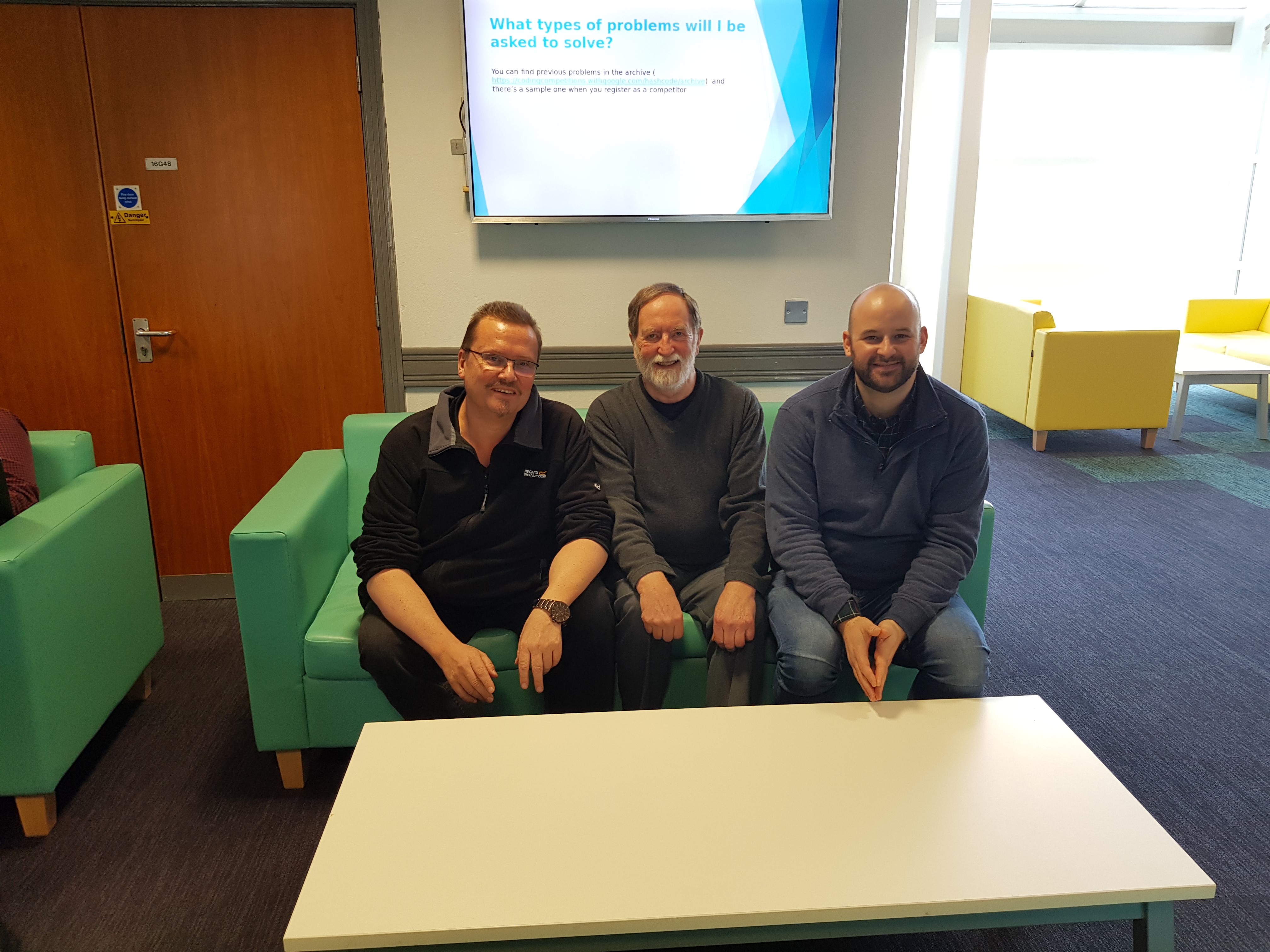
In my secondment to Ulster, I clarified many things around the topic „Chatbots supporting the care of Persons with Disorder (PwD)“. In the first secondment period, I had to learn from Mike and Raymond, how Chatbots (CB) work, what they are possible to do nowadays and how they currently support the mental health scenarios.
We talked about the privacy and data protection. Based on this knowledge, I created the following weeks some ideas, how to improve the CB Mental Health support. For me it was clear, that we need Artificial Intelligence (AI) in order to extend our possibilities. So Mike showed me some existing CB platforms (Google Dialogflow, Babylon Health, Wysa) and presented even own implemented CBs. New questions and new requirements came up!
How is it possible to connect CBs with intelligent Knowledge Networks (KN) in order to us AI?
How to build and feed such a KN?
How to integrate smoothly the CB together with the KN into an existing Knowledge Management System?
So the task was clear: Work out answers for this questions! I created some call for master thesis for this tasks. After presenting my rough ideas, we needed to discuss the ethic parts oft he CB support. Details about such discussions can be found in Raymonds deliverable.
In order to become more concrete about the CB supporting process, I asked Marialucia (communication technology nowadays makes the secondment live more flexible 😉 about the interests of Psychologists for such a PwD support by CBs. We identified the „most wanted“ support scenario (support of the „PwD get to sleep“ process) and we created a User Story based on it. Derived from this User Story, I specified the technical requirements, which I briefly discussed with Raquel and Manés.
Implied from the ethic discussions with Raymond it was clear, that the consortium has to create a Data Management Plan (DMP), e.g. to avoid some trouble with the
EU General Data Protection Regulation (GDPR). Therefore I spent the rest of my time in collecting data requirements from partners and in writing a EU Project compliant DMP.
